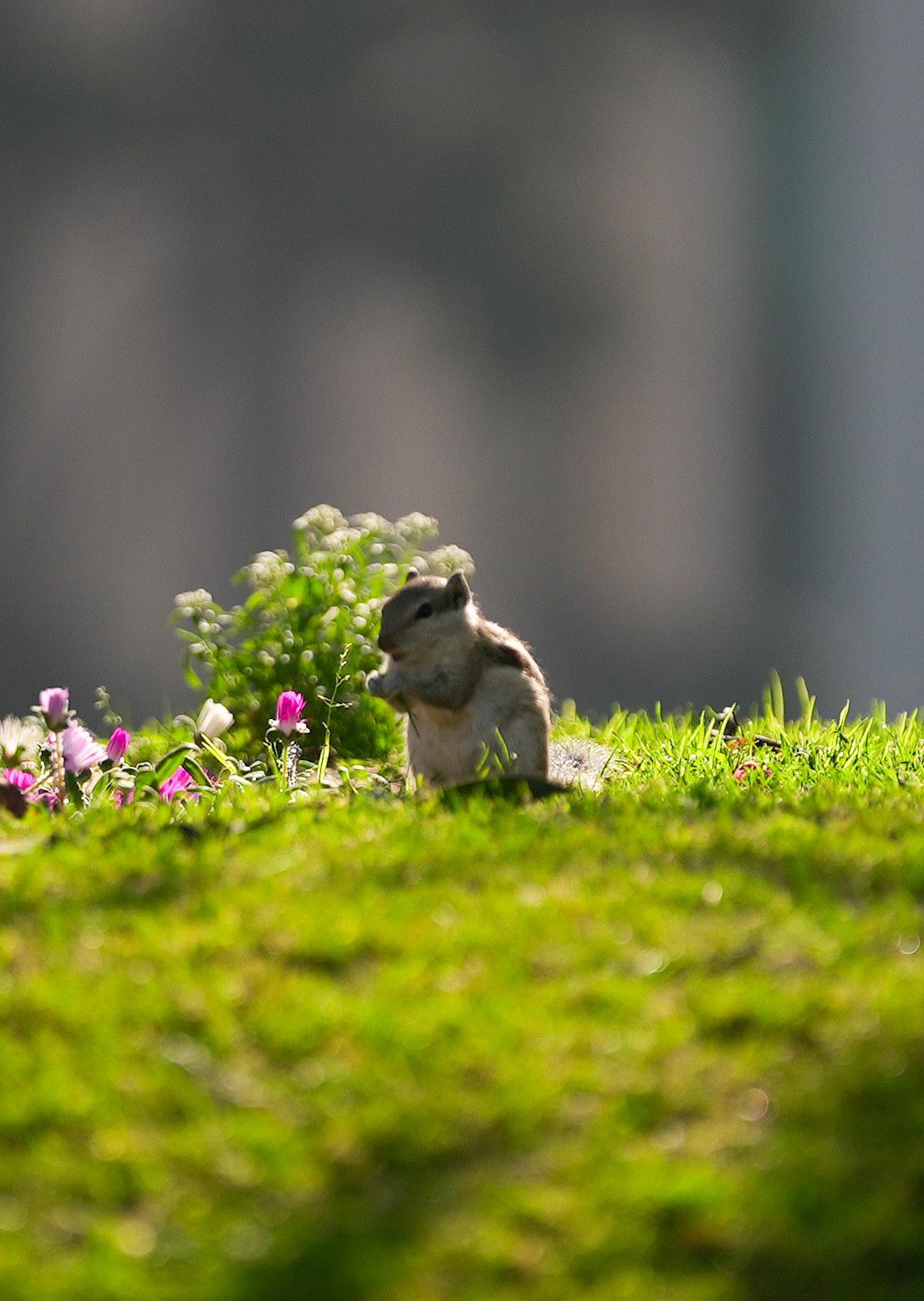

Editor’s Note
Welcome to the second issue of the School of Humanities and Social Sciences newsletter!
Following a fantastic first issue, we’re back with more exciting news. Over the past two months, SHSS has been abuzz for all the right reasons.
Our faculty members had an incredible summer, earning prestigious awards that recognize their hard work and dedication. These accolades celebrate individual excellence and boost the school’s reputation.
Our students and faculty have been busy with groundbreaking research, including the excavation of a 4,000-year-old civilization. This work is not only deepening our understanding of history but also giving students invaluable, hands-on learning experiences.
The connection between research and education is at the heart of what we do. By fostering inquiry and discovery, we’re preparing the next generation of leaders.
In addition to our research, our community has been active with a variety of events, workshops, and seminars. These meetings have brought students and faculty together to discuss important topics and collaborate on new projects, strengthening our bonds and sparking fresh ideas.
We’re also proud to announce that our students have launched a 180 Degrees Consulting chapter at the university. This initiative aims to build a consulting culture among students, a skill that’s highly sought by major employers.
As we look to the future, we’re reminded of Ralph Waldo Emerson’s wise words: “The only person you are destined to become is the person you decide to be.” Every achievement and collaboration shapes our future, so let’s keep pushing boundaries and making a meaningful impact together.
We hope you enjoy this issue, and here’s to a season of inspiration and accomplishment!
From the Dean’s desk
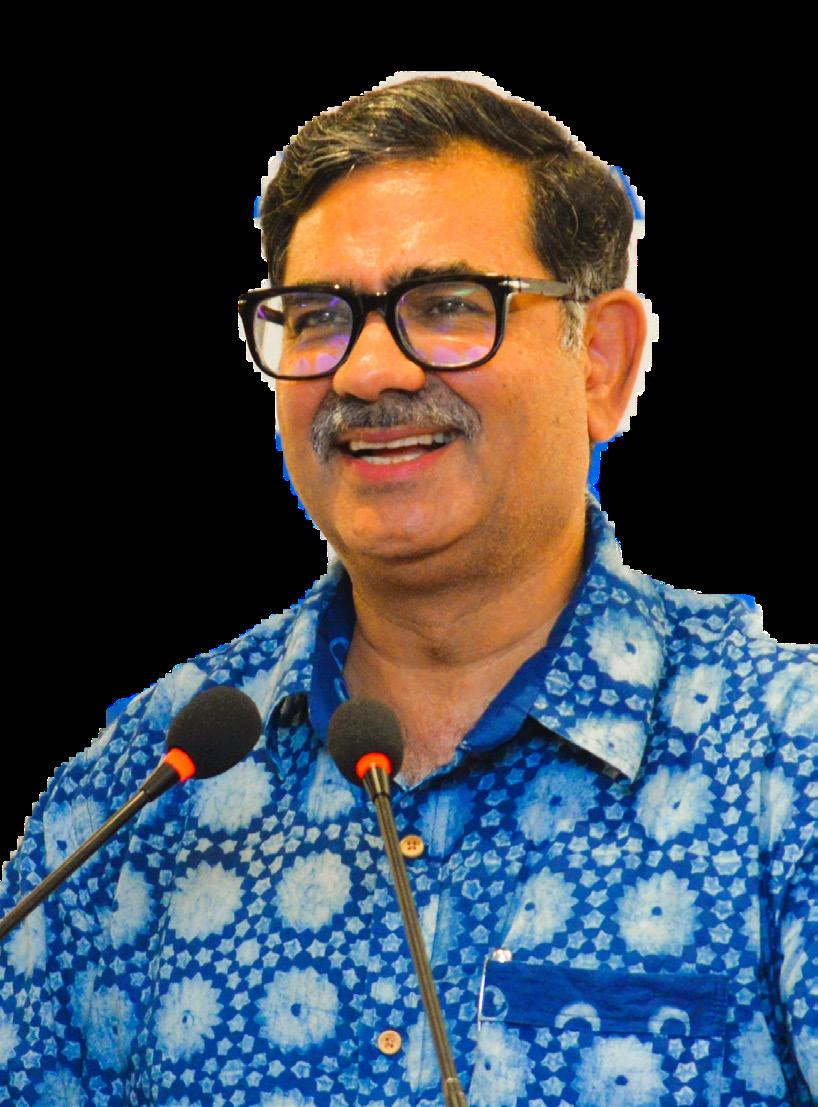
PROFESSOR RAJAT KATHURIA Dean, School of Humanities and Social Sciences
Greetings, everyone!
As we kick off another exciting academic year, I’ve been reflecting on the recent experience of the School of Humanities and Social Sciences (SHSS). It is truly buzzing with energy and intellectual curiosity. We’ve unearthed a 4,000-year-old civilization in Karnataka, launched new and exciting programs, won awards, and published patents—it’s been a busy and rewarding few months.
Our students continue to soar to new heights, and this year was no exception. Trinanjana Sen from the Department of History & Archaeology
won a silver medal at the 2025 Convocation, a testament to the exceptional talent and commitment we foster at SHSS.
As the poet Iqbal beautifully put it: “Tu shaheen hai, parwaaz hai kaam tera, Tere saamne aasmaan aur bhi hain.” (You are a falcon, your task is to fly, and there are still other skies before you.) It’s a joy to watch this collective flight, and I know all our well-wishers agree.
The past few months have been a true testament to our collective work and dedication. Our faculty has earned well-deserved accolades, our students have launched groundbreaking initiatives, and the spirit of inquiry is more alive than ever. We’re a community that doesn’t just discuss ideas; we bring them to life!
I encourage you to dive into this newsletter and get a sense of the fascinating journey SHSS has been on recently. Your suggestions and continued support are what fuel our efforts.
Here’s to a year of unexpected breakthroughs and a whole lot of learning!
So fly high !!
Every graduating class from the School of Humanities and Social Sciences has consistently demonstrated remarkable academic achievement. Last year, the school proudly attained both the gold and silver medals, highlighting its dedication to excellence.
Tanmay from the Department of Sociology secured the gold medal, while Aditya Ramakrishnan from the Department of International Relations & Governance Studies earned silver. This tradition of success continued this year with Trinanjana Sen from the Department of History & Archaeology winning the silver medal, further showcasing the exceptional talent and commitment fostered at the School.
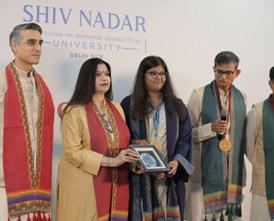
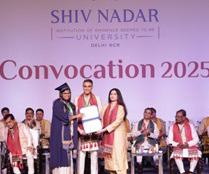
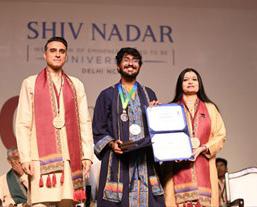
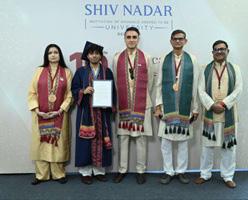
Celebrating Excellence: Faculty Achievements and Engagements
We begin by highlighting the remarkable accomplishments and contributions of our faculty members across departments. From prestigious awards to groundbreaking research initiatives, our educators are making significant strides in their fields. Their dedication not only elevates their individual profiles but also enhances the reputation of our school.
Join us in celebrating their hard work and inspiring engagements that foster a vibrant academic community!
DR. SRUTHI MURALEEDHARAN ASSISTANT PROFESSOR, DEPARTMENT OF INTERNATIONAL RELATIONS AND GOVERNANCE STUDIES
Article “Engendering Indian Foreign Policy Analysis: AIWC, Women Delegates and Diplomatic Praxis” co-authored with Ph.D. Scholar Tejasvi Saxena (pp. 101113).
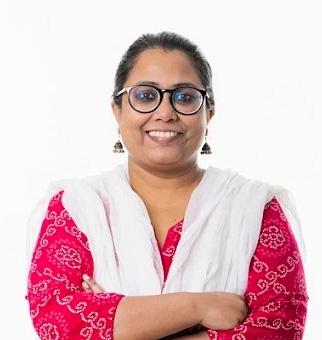
DR. MEDHA ASSISTANT PROFESSOR, DEPARTMENT OF INTERNATIONAL RELATIONS AND GOVERNANCE STUDIES
Article “Undoing Borders for Counter-hegemonic Ends: Theorising an Alternative Foreign Policy Imaginary for India” (pp. 86-100).
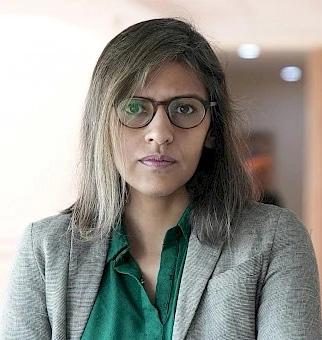
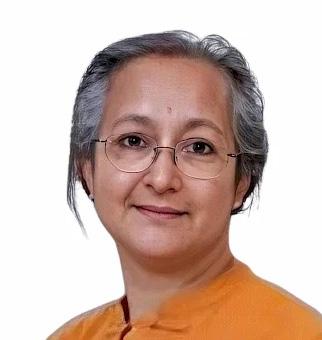
PROFESSOR RAJESWARI S RAINA DEPARTMENT OF INTERNATIONAL RELATIONS AND GOVERNANCE STUDIES
Journal Articles
“Community-led institutional innovation: Groundwater sharing, values and relationships in India’s rainfed farming systems”, Studies in the History and Philosophy of Science (August 2025), co-authored with Prof. Helen Longino (Stanford University)
Academic/Public Service Roles Outside Shiv Nadar University
Reviewed abstracts submitted to the 18th Biennial Conference of the International Society of Ecological Economics (ISEE) held in Oslo, Norway (June 23-27 2025)
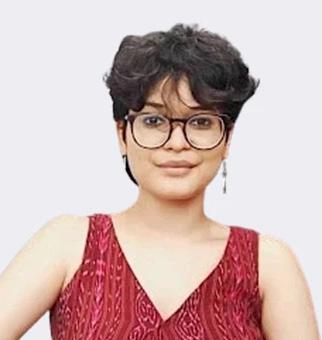
DEPARTMENT
Recent Publications
DR. BHARGABI DAS ASSISTANT PROFESSOR
OF RURAL MANAGEMENT
We are proud to share a selection of recent publications by Dr. Bhargabi Das, which engage with themes of environmental racism, anti-racist pedagogy, planetary ecologies, and the lived experience of migrant scholars.
• Das, B. (2025). The Ecopolitical Spirituality of Miya Poetry: Resistance against environmental racism of the majoritarian state in Assam, India. Religions, 16, 437–456.
• Das, B. (co-author). (2025). Planetarity of Environmental Humanities South: Decolonizing Nature in Highland Asia. Challenges, 16, 1–19.
• Das, B. and Ivasiuc, A. (2025). CARE: Caring, Anti-Racist Education and Decolonial Pedagogies in the Neoliberal University and a Colonial-Born Discipline. Educação, Sociedade & Culturas, 70, 1–20.
• Das, B. (2025). Foregrounding loneliness of PhDing of a migrant woman academic of colour: the Irish neo-liberal academia and non-dialectics of loneliness and “speaking up”. Educational Review, 1–18.
• Das, B. (2025). Erosion of land and citizenship: A Case of Chars of Assam, India. Sociological Bulletin, 1-14.
DR. KAPIL PATIL
ASSISTANT PROFESSOR, DEPARTMENT OF INTERNATIONAL RELATIONS AND GOVERNANCE STUDIES
The Shiv Nadar University, Department of International Relations and Governance Studies (IRGS), in collaboration with the Chair of Science, Technology and Gender Studies at FAU Erlangen-Nürnberg, Germany, recently hosted a pivotal workshop.
Focusing on the Geopolitics of Radiation Protection, this event brought together experts to explore the intricate intersections of science, policy, and public awareness.
The workshop was led by Dr Kapil Patil, Assistant Professor, IRGS, Shiv Nadar IoE, and Professor Dr. Maria Rentetzi, FAU. It featured various themes, including scientific knowledge production on radioactive fallout, peace and solidarity networks, the nuclear environments, testing sites, risk communications, and atomic exhibitions. It also featured a roundtable discussion, “Science on Display,” featuring museum curators, archivists, and science counsellors.
The workshop was organised as part of the European Research Council (ERC)-sponsored research project, “Living with Radiation: The History of Radiation Protection at the International Atomic Energy Agency.”
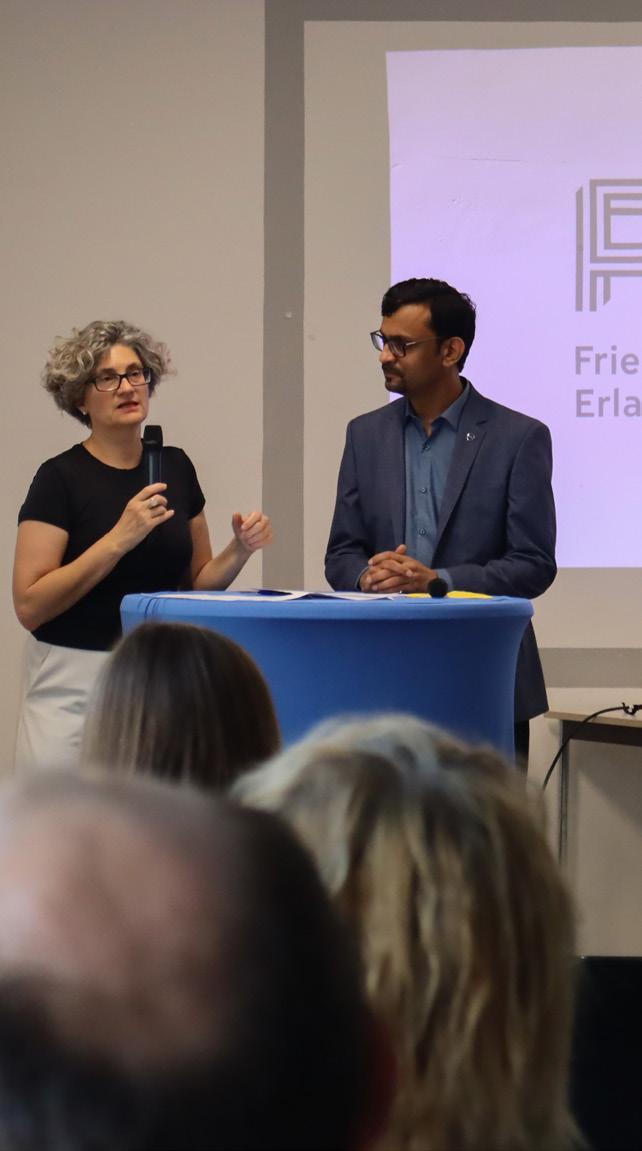
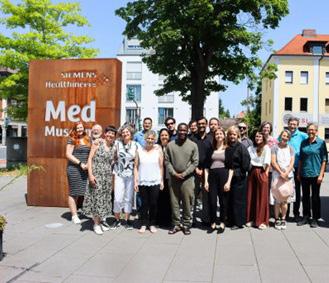
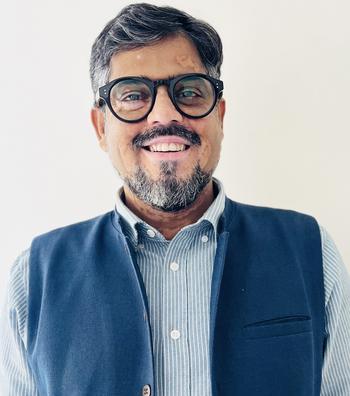
Journal Articles / Book Chapters
● “The Ambiguity of Peace: Global Governance and the Unequal Ordering of War” in “Research Handbook on Global Governance” (Edward Elgar, September 2025), co-authored with Dr. Hendrik Simon (Peace Research Institute Frankfurt).
Invited Lecture/Talk/Conference/ Workshop/Presentation
● Led a session on the Melian Dialogue of Thucydides for undergraduate students at National Law School of India University (NLSIU), Bengaluru (May 8 2025).
● Guest Speaker at St Joseph’s University, Bengaluru, for an interaction with undergraduate students, exposing his current research on theorizing world politics in a complex world (July 3 2025).
PROFESSOR SIDDHARTH
MALLAVARAPU
DEPARTMENT OF INTERNATIONAL RELATIONS AND GOVERNANCE STUDIES
Books “Studies in Indian Politics” (Volume 13 Issue 1, June 2025)
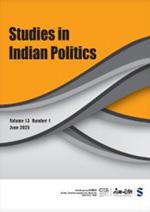
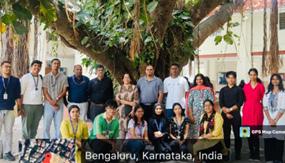
Academic/Public Service Roles Outside SNIoE
● External member for curriculum review, Department of International Relations at Ashoka University (May 2 2025).
● Special Invitee, Board of Studies meeting for curriculum review of the GITAM School of Humanities and Social Sciences, Hyderabad, to deliberate on the curricula of the Political Science department (May 20 2025).
● Guest Editor – “Studies in Indian Politics” (Volume 13 Issue 1, June 2025), special section on ‘Theorizing India’s Foreign Policy’.
● Article “Theorizing Foreign Policy: An Invitation from India” (pp. 41-47).
● Article “Classical Realism and Indian Foreign Policy: Some Cautionary Notes” (pp. 114–126).
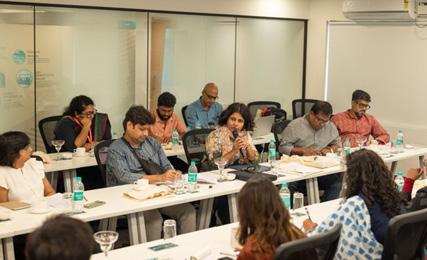
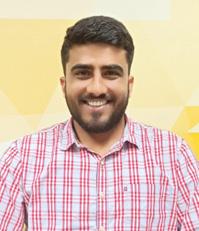
Participated in an International workshop on “migration, mobility and social transformation” co-hosted by the Centre for Asian Studies, GITAM and the Max Weber Stiftung, New Delhi on 21st–22nd April 2025 at the GITAM City Office, Bengaluru.
DR. DEVENDRA KUMAR ASSOCIATE FELLOW CENTRE FOR HIMALAYAN STUDIES
Co-authored journal article with Prof James Leibold (La Trobe University) , titled “Vanishing Quotas: Tibetan Political Disenfranchisement in Xi Jinping’s New Era of Han-Centrism.” It has been published in the China Journal (Chicago University Press) and it is the first article out of an ongoing project on China’s policies in Tibetan areas.
Read the article here - https://www.journals.uchicago. edu/doi/10.1086/735426
Heinrich Böll Stiftung New Delhi, in collaboration with the Council for Strategic and Defense Research (CSDR), organized a webinar focused on how the strategic partnership between the EU and India rooted in shared interests can turn structured dialogue into actionable results. Key speakers included our Dean Professor Rajat Kathuria, Dr. Amaia Sanchez Cacicedo from Institut Montaigne, and Dr. Stephan Hesselmann from the German Embassy in New Delhi. The session was moderated by Karthik Nachiappan from the Institute of South Asian Studies (ISAS-NUS).
The discussion covered topics such as digital transformation, climate collaboration, supply chain resilience, and multilateral engagement, emphasizing the evolving role of the EU-India Trade and Technology Council (TTC) in shaping a proactive agenda. The webinar also launched a new policy brief titled “Unlocking Potential: The EU-India Trade and Technology Council.”
Watch the webinar recording
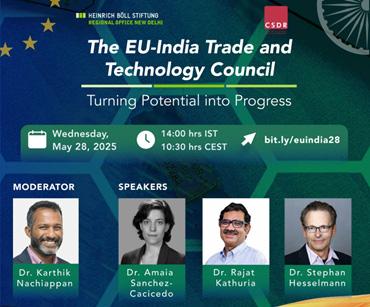

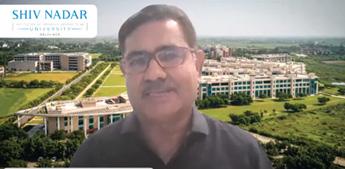
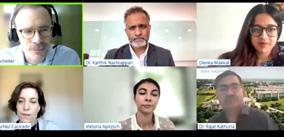
Professor Rajat Kathuria and Neha Gupta discussed India’s future trade strategy in the July/August 2025 issue of the Japan Spotlight, published by the Japan Economic Foundation. Their article, titled “The Role of a Rules-Based Trading System for Strengthened Supply Chain Resilience: Policy Framework for a Business-Friendly Environment, Inclusive Trade Liberalization, & Maximizing Benefits from FTAs,” explores key aspects of trade policy.
Read the complete paper here - https://www.jef.or.jp/jspotlight/latestissue/
Institute for Studies in Industrial Development
The Policy Roundtable on Inclusive AI for Development delved into UNCTAD’s Technology and Innovation Report 2025. The discussion focused on the critical role of artificial intelligence in promoting sustainable development and ensuring that its benefits are accessible to all. Experts explored strategies for fostering inclusive innovation, addressing challenges, and leveraging AI to drive economic growth and social equity.
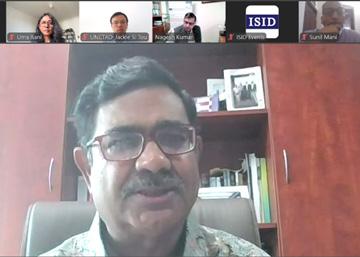
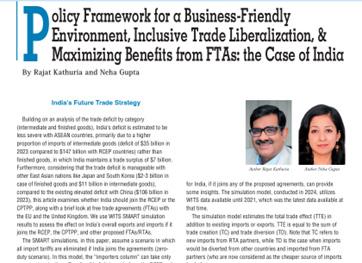
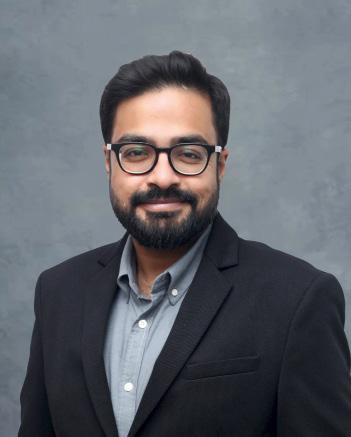
DR. PUNARJIT ROYCHOWDHURY HEAD, DEPARTMENT OF ECONOMICS
Dr. Punarjit Roychowdhury’s, paper has received the Best Paper Award (second prize) in Economics at Research Symposium on Finance and Economics 2025 organized by IFMR-Krea University!
Punarjit and the PhD scholars under his mentorship co-authored and presented their papers at the 2nd Development Economics Workshop at Durham University, UK.
One paper was co-authored with Shreemoyee and Gaurav Dhamija and the other with Sourish Mustafi and Bharti Nandwani.
The papers were presented by Shreemoyee from IIT Hyderabad, and Sourish Mustafi from Shiv Nadar University.
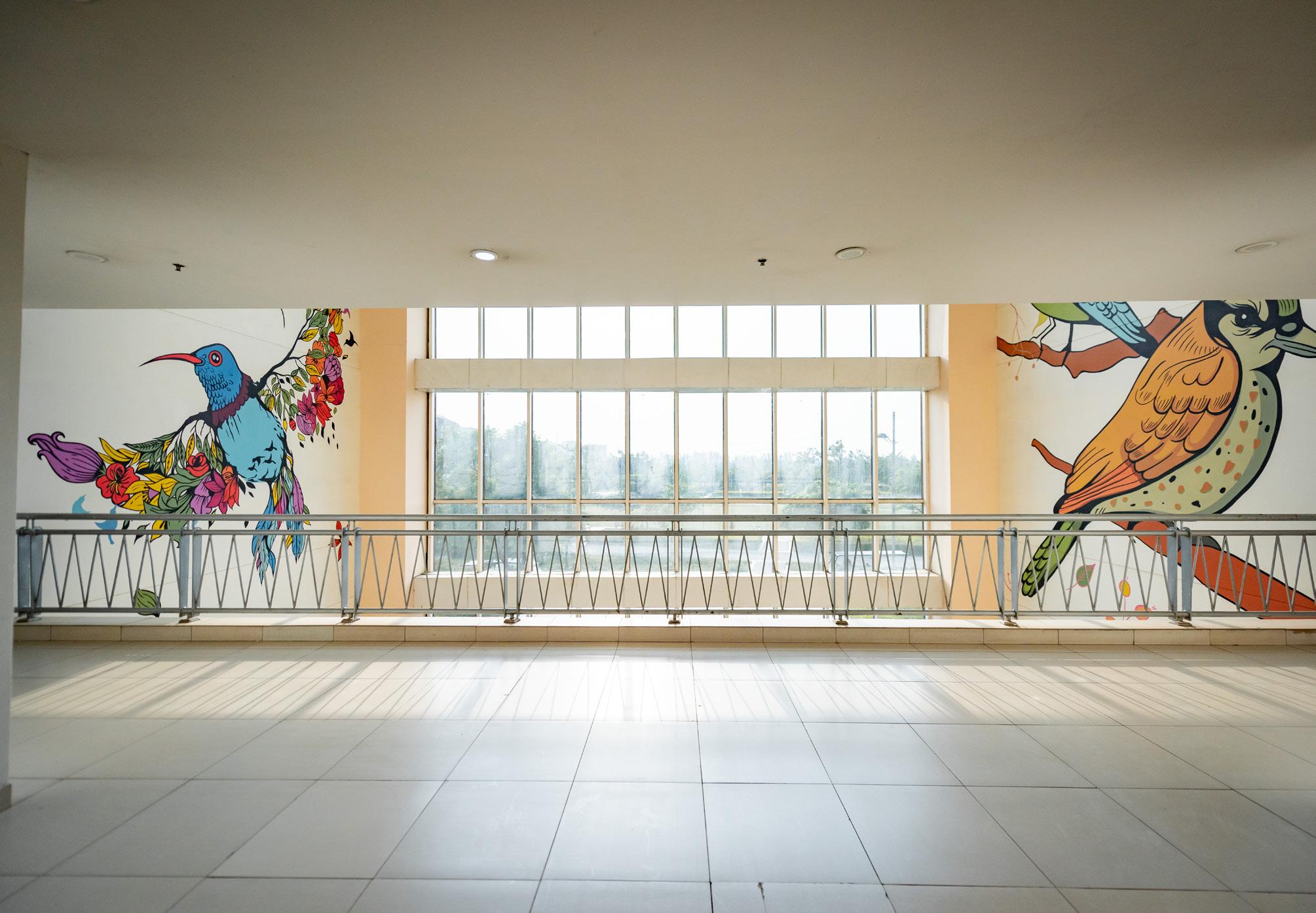
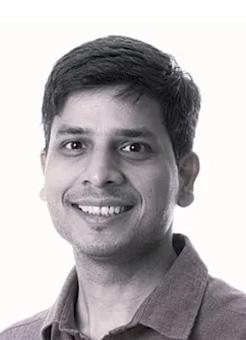
On 1 July 2025, Dr. Atul Mishra participated in a closed-door conversation on India’s regional relations at the Pune International Centre, Pune. While there, Dr. Mishra was interviewed on The IranIsrael Crisis, US Power, and India’s Dilemma.
Watch the complete conversation here : https://lnkd.in/ggHBxQFW
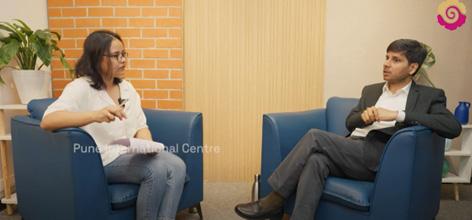
Newspaper and Magazine Articles
● “Classic strategy: what to remember when reading Kautilya’s Arthashastra’, India’s World, 1(4), July-August 2025, 108-111.
●“Is IR theory useful for policy?’, India’s World, 1(3), May-June 2025, 53-55.
●“As the US joins Israel’s bombing of Iran, what is the endgame?”, Scroll.in (June 22 2025)
DR. ATUL MISHRA ASSOCIATE PROFESSOR & HEAD, DEPARTMENT OF INTERNATIONAL RELATIONS AND GOVERNANCE STUDIES
Invited Talks
● “Geopolitics, geoeconomics and the unmaking of the world order’, 1st Special Course for Foreign Diplomats from Central and Western African Countries at the Sushma Swaraj Institute of Foreign Service, Ministry of External Affairs, Government of India, New Delhi (July 16 2025)
● “De-bordering and re-ordering: reconceptualizing the Northeast’, conference ‘Border Dynamics in Northeast India: Challenges, Opportunities and Policy Imperatives’, Baptist College, Kohima, India (June 12 2025)
● “IR theory for policy makers’, four-part lecture delivered to Officer Trainees of the Indian Foreign Service, Sushma Swaraj Institute of Foreign Service, Ministry of External Affairs, Government of India, New Delhi (June 3 2025).
● “What on Earth! Geopolitics, Geoeconomics, and the Unmaking of International Order’, distinguished lecture delivered to the 72nd Professional Course for Foreign Diplomats (PCFD), the flagship programme of the Sushma Swaraj Institute of Foreign Service, Ministry of External Affairs, Government of India, New Delhi (May 19 2025).
Conference/Presentation
● “Ordering the world: the place of rules in contemporary Indian international thought’, symposium ‘Rules for a lawless world? The international legal order in an age of great-power struggle for normative primacy’, Leiden University, The Netherlands (May 8 2025).
Media Interviews
● “The long shadow of partition on India-Pakistan relations”, Puliyabaazi podcast, conversation with Khyati Pathak and Pranay Kotasthane (May 15 2025)
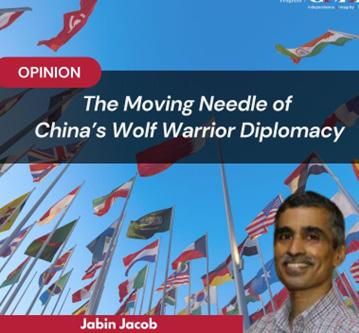
Journal Article
● “China in Egypt: Converting Economic Engagement into Political Capital”, Journal of Indian Ocean Studies. Co-authored with Vishal Choudhury (May 2025).
Media Articles
●“Tariff warrior diplomacy”, The Indian Express (May 1 2025)
●“China’s calculated neutrality on Pahalgam”, The Tribune (May 1 2025)
●“The Moving Needle of China’s Wolf Warrior Diplomacy”, India’s World (May-June 2025)
● “China and an American Pope in Rome”, Deccan Herald (May 17 2025).
● “Delhi’s multilateralism plank needs tweaking”, Hindustan Times, co-authored with Devendra Kumar (July 3 2025)
● “China’s ‘National Rejuvenation’ v/s MAGA”, India’s World, Vol. 1, Issue 4, pp. 105-107 (July-August 2025).
● ”China’s new trilaterals reshaping regional balance in South Asia”, Deccan Herald, p. 14 (July 20 2025).
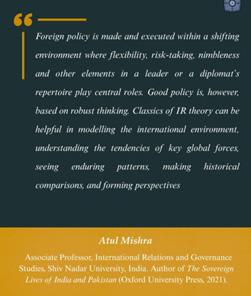
DR. JABIN THOMAS JACOB ASSOCIATE PROFESSOR, IRGS, DIRECTOR, CENTRE OF EXCELLENCE FOR HIMALAYAN
STUDIES
Invited Lecture/Talk/Conference/Workshop/ Presentation
● “Is Regional Cooperation Possible Without Bilateral Cooperation?”, workshop China’s Chairmanship in the SCO: Concerns and Prospects for the Organization’s Development, organized by the Institute for Advanced International Studies, The University of World Economy and Development, Tashkent, Uzbekistan, Shanghai Academy of Social Sciences and Fudan University, Shanghai (May 15 2025).
● ‘India-China Relations: Navigating Competition and Cooperation in the Indo-Pacific’, Naval Staff and Technical Management Course, Naval War College, Goa (June 24 2025)
● Discussant at the Centre for Social and Economic Progress seminar series “China in South Asia” (July 4 2025)
InterviewsPresentation
● “Slogans to Silence: Is China Burying Galwan Like Tiananmen?” StratNews Global (June 19 2025)
● “Dalai Lama Successor: Is India Wasting Its Dalai Lama Advantage?” India Today Global, Statecraft. Ep. 150. (July 2 2025).
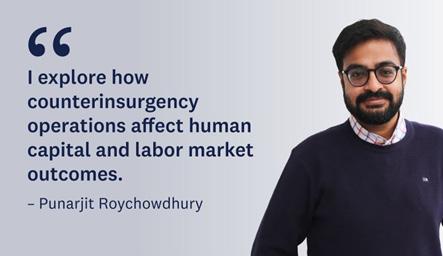
From Shiv Nadar University, he is exploring how counter insurgency operations impact human capital and labor markets - investigating critical intersections between conflict and economic outcomes.
Punarjit Roychowdhury and the co-authors for receiving the Best Paper Award (Second Prize) in Economics at the Research Symposium on Finance and Economics 2025, organized by IFMR-Krea University!
The patent for “Tablet Dispenser” filed by Dr. Prakash Kumar and Design minor student Samrath Suri has been granted by The Patent Office, Government of India on 27 June 2025. The invention helps obtain exactly one tablet from the bottle without spilling out or touching/ contaminating other tablets. This also prevents contamination or moistening of tablets that degrade due to exposure to moisture, dust or biological contamination. The simple inexpensive structure of the solution enables its integration with the existing pill bottles. It has great commercial potential.
DR. PUNARJIT ROYCHOWDHURY
ASSOCIATE PROFESSOR, AND HEAD DEPARTMENT OF ECONOMICS VISITING SCHOLAR -UNU-WIDER
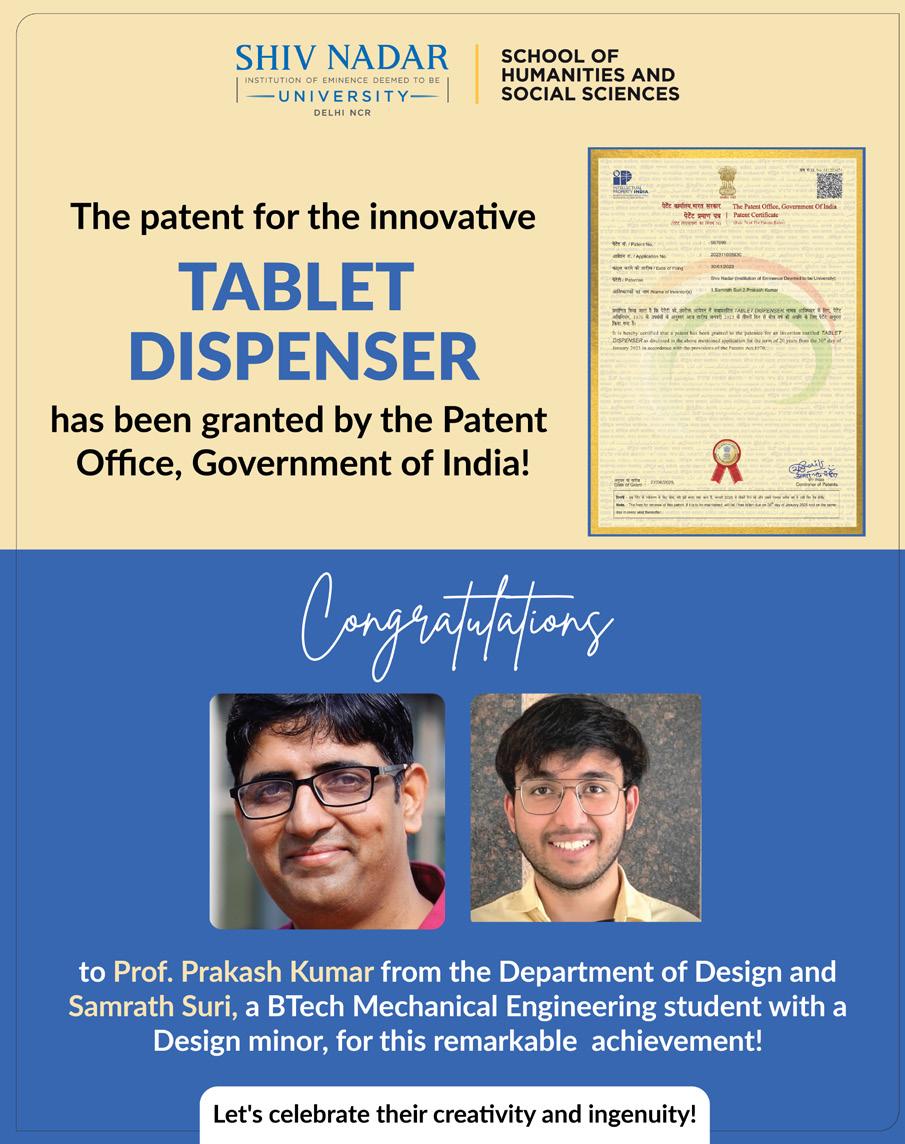
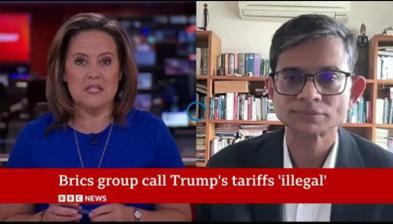
DR. VASUNDHARA BHOJVAID
ASSISTANT PROFESSOR, DEPARTMENT OF INTERNATIONAL RELATIONS AND GOVERNANCE STUDIES
Dr. Vasundhara Bhojvaid presented her paper ‘Making Breathing Visible: Agricultural Practices and Urban Atmospheres in India’ at the conference ‘Multispecies Health in the City: Going Beyond the Green’ organized by Edinburgh University’s Climate Change Institute, on 29-30 April 2025.
Dr. Vasundhara Bhojvaid’s contribution ‘Airs’ has been published in ‘Environmental humanities: Emergent key terms’ edited by Ulrick Ekman and Daniel Irrgang, Department of Arts and Cultural Studies, University of Copenhagen.
DR.
ANITA SHARMA ASSISTANT PROFESSOR, DEPARTMENT OF SOCIOLOGY
Dr. Anita Sharma published a paper, ‘Pastoralism and the state: The changing profile of pastoralism in India today.’ 2025, Nomadic Peoples.
Dr. Anita Sharma gave a talk at Welkin School, Sopore, Kashmir, titled ‘Custom, mobility, and ecology: learning about and from the Gujjar, Bakkarwal and Chopan pastoralists of Jammu and Kashmir’, held to initiate a conversation about the Salim Node Certificate Programme on Pastoralism and Pastoral Ecosystems in educational institutions in Jammu and Kashmir.
Professor Partha Chatterjee, a nationally recognized macroeconomist, was invited by BBC News to discuss the BRICS summit. He is a regular commentator and columnist on economic issues.
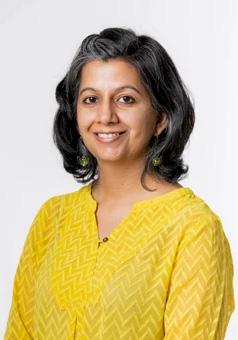
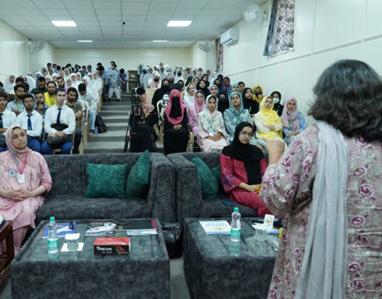
DR. SUBHASHIM GOSWAMI
ASSOCIATE PROFESSOR, HEAD
DEPARTMENT OF SOCIOLOGY
Dr. Subhashim Goswami conducted a workshop titled “Warp and Weft: Crafting Anthropology through Toddler Theatre” at the Society for Cultural Anthropology Biennial titled “Restorative Relations” held in Stony Point, New York, 9-10 May 2025. Dr. Goswami used threads and spools to play with the idea of tactility combining it with movement and body to comment on how we write and produce narratives.
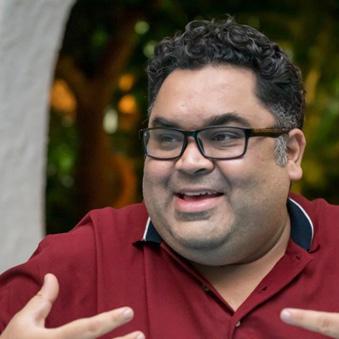
Dr. Subhashim Goswami presented a paper titled “Unwriting the Non-Verbal/Sensorial” at the 17th Congress titled “Unwiriting” of the International Society for Ethnology and Folklore (SIEF) at the University of Aberdeen. June 3 -6, 2025.
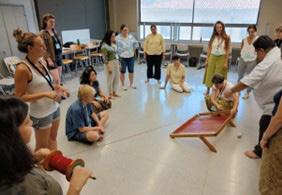
DR. TUHINA GANGULY
ASSISTANT PROFESSOR, DEPARTMENT OF SOCIOLOGY
Dr. Tuhina Ganguly and Dr. Subhashim Goswami’s collaborative piece drawing from their Wenner Gren Workshop grant “Cosmopolitics in the Contemporary” has been published in Novos Debates, a biannual journal of the Brazilian Association for Anthropology. The article titled “The Cosmopolitics of Inhabiting Multiple Worlds” 2025 has also been translated into Portuguese for wider dissemination. https://doi.org/10.48006/2358-0097/ V10N2. E102011
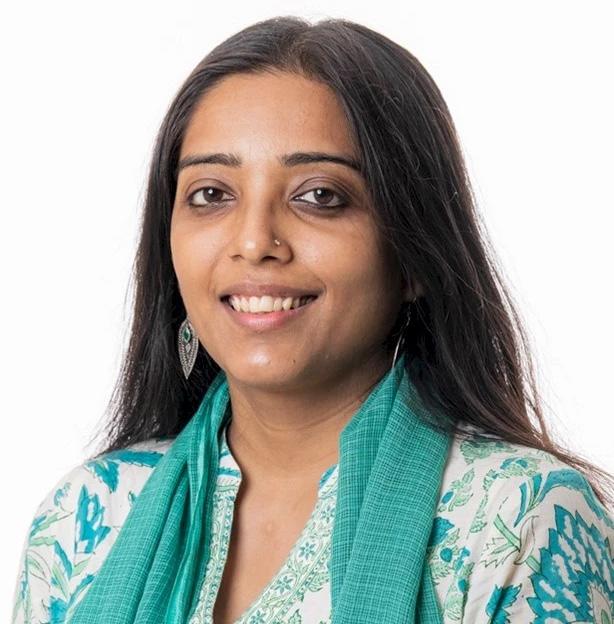
PROFESSOR YASMEEN ARIF DEPARTMENT OF SOCIOLOGY
Professor Yasmeen Arif participated in “Workshop related to the Biopolitics and Global Health after Covid19”, at Cornell University, May 5-7, 2025.
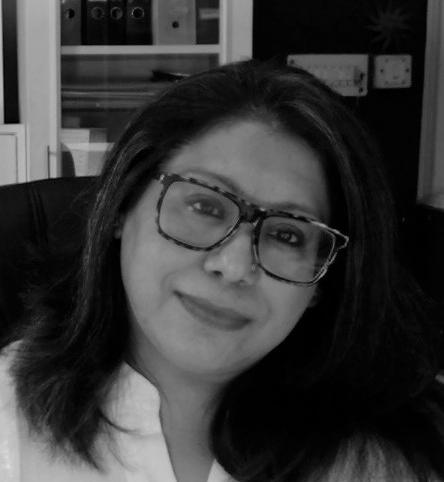
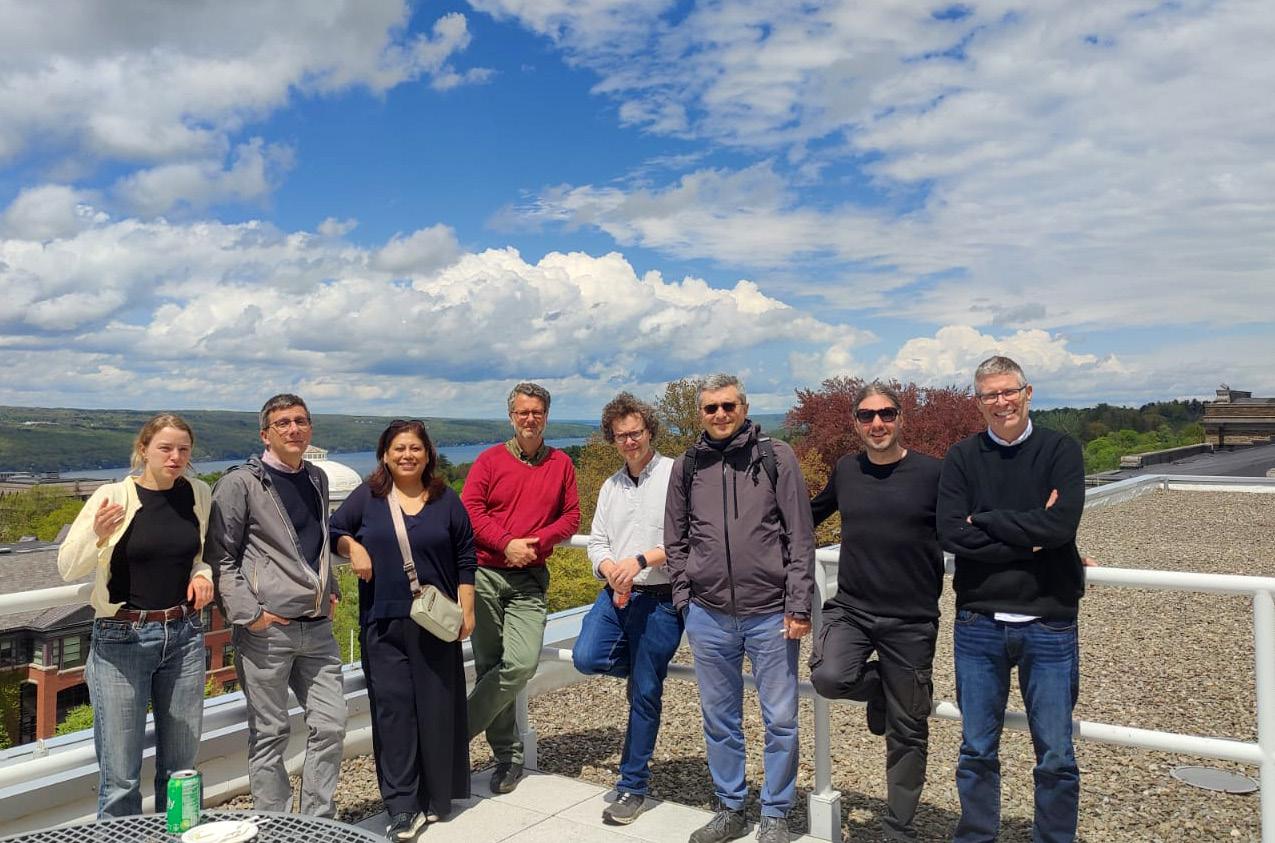
11th SERI Workshop
The 11th SERI Workshop was held at SNIoE from July 17-19, 2025, organized by the Society for Economics Research in India (SERI) to support early-career researchers. The Workshop provides a platform for presenting academic papers and receiving feedback.
Dr. Rajat Kathuria, Dean of SNIoE, emphasized the institute’s commitment to collaboration and critical thinking in his opening speech. Dr. Punarjeet Roychowdhury highlighted SERI’s role in fostering a sustainable research culture for young economists.
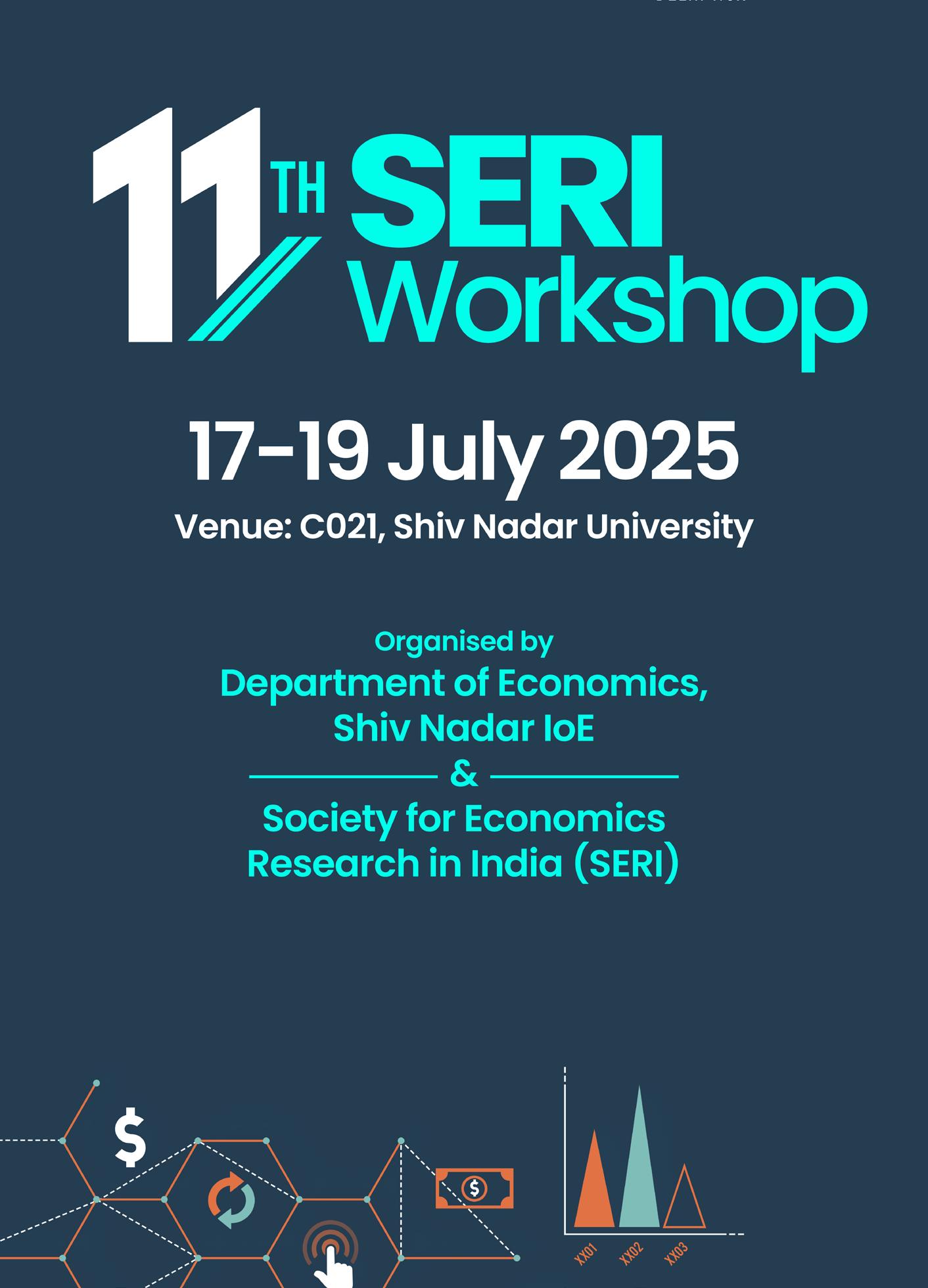
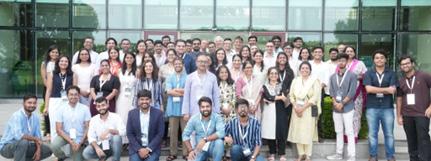
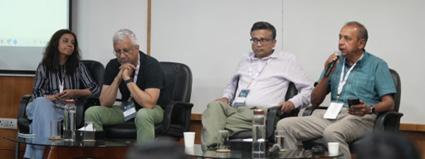
The panel discussion on academic publishing featured economists like Dilip Mookherjee and Farzana Afridi, offering insights on navigating the publishing landscape and the importance of novelty in research. Debraj Ray’s remark, “Publishing over Perishing,” captured the session’s essence.
A thematic session on Gender and Development, chaired by Professors Gitanjali Sen and Shabana Mitra, addressed topics such as gender bias in education and women’s roles in climate change. Discussions highlighted the significance of financial independence for women in India.
Research presentations spanned microeconomics, macroeconomics, and development, covering diverse issues. Express talks by PhD scholars encouraged the sharing of emerging ideas.
The Workshop welcomed esteemed economists from institutions like UMass Amherst and the World Bank, enhancing scholarly exchange. Overall, the 11th SERI Workshop maintained its tradition of academic excellence and supported the growth of early-career economists in India.
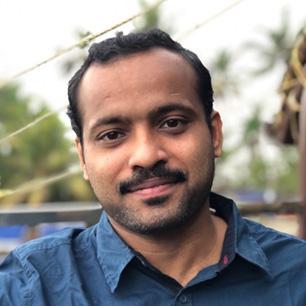
DR. P.C. SAIDALAVI ASSISTANT PROFESSOR, DEPARTMENT OF INTERNATIONAL RELATIONS AND GOVERNANCE STUDIES
Dr. P.C. Saidalavi has published an article titled “Seeking antassu: The making of a Muslim barber in South India” in the journal HAU: Journal of Ethnographic Theory 15 (1): 45–58. https://doi.org/ 10.1086/734600
The article looks at how a marginalized group sought to construct dignity for themselves and their work of barbering by moving away from the patronage networks in which they were involved. By unionizing themselves, establishing shops and instituting money as the sole method of compensation, Muslim barbers in South India modulated their new relationships according to capitalist market relations and constructed a new understanding of self and community.
DR. CARLOS FREDERICO PEREIRA DA SILVA GAMA
ASSISTANT PROFESSOR, DEPARTMENT OF INTERNATIONAL RELATIONS AND GOVERNANCE STUDIES
Articles
● “What US joining Israel’s war with Iran means for the world”, 360 Info (June 22 2025)
● “BRICS+ meets in Rio amid global shifts and internal fractures”, 360 Info (July 5 2025)
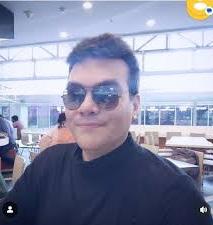
Invited Lecture/Talk/Conference/Workshop/Presentation
● Keynote speaker, Shiv Nadar School Model United Nations Conference 2025 (May 16 2025)
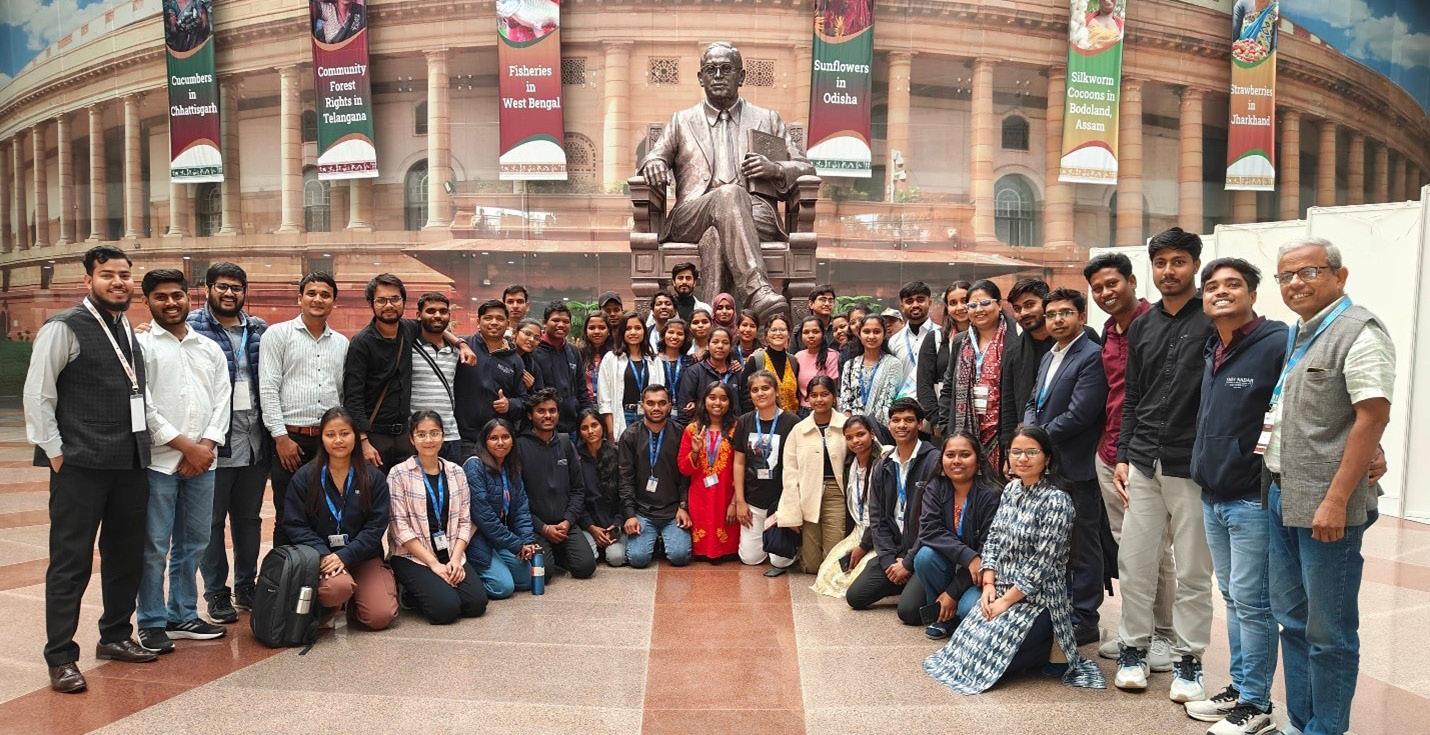
Immersive Learning for MARM Students at Samanvay: The National Tribal Livelihoods Summit (BRLF) 2025
On 20th February 2025, the second batch of MA Rural Management students attended Samanvaythe National Tribal Livelihoods Summit 2025, organized by the Bharat Rural Livelihoods Foundation (BRLF). Held at the Dr. Ambedkar International Centre, New Delhi, the summit convened grassroots practitioners, policy architects, development scholars, state partners, and aspiring professionals dedicated to advancing equitable and sustainable rural futures. Rooted in the Sanskrit words “Sama” (सम), meaning ‘equal’, and “Anvay” (अन्वय), meaning ‘connection’ or ‘convergence’, Samanvay symbolizes the harmonious integration of diverse perspectives and collective responsibility. As BRLF’s flagship annual event, Samanvay nurtures a collaborative space for deep reflection, shared learning, and multi-stakeholder dialogue focused on transforming India’s tribal geographies, where systemic challenges often hinder inclusive development.
A key highlight was the keynote address by Dr. Mihir Shah (Distinguished Professor & Chairperson, M.A. Rural Management Program), Founder President and Mentor, BRLF. The address gave a brief glimpse of the exciting BRLF journey, which was described in the formative years by many as Mission Impossible, given the unique vision and mandate of BRLF, which was formed as an autonomous Society by the Government of India and tasked with rebuilding trust in the Adivasi-dominated areas of the country, which were suffering from a twin deficit of democracy and development. BRLF has developed a new model built on partnerships of civil society with government and Panchayati Raj Institutions to deepen both grass-roots democracy and inclusive and sustainable development. The session aligned closely with the ethos of the M.A. Rural Management program, and for the students, Samanvay was much more than a formal conference, it was a space of co-learning, celebration, and affirmation. They participated in thematic sessions, interacted with seasoned development practitioners, and reflected on how the embodied lifeworlds of tribal communities rooted in equity, inclusion, and sustainability must remain central to frameworks of rural transformation. As one student noted, “Samanvay reminded us that rural development is not only about systems and schemes, but also about listening, unlearning, and reimagining the future in solidarity with tribal voices.
COLLABORATIONS
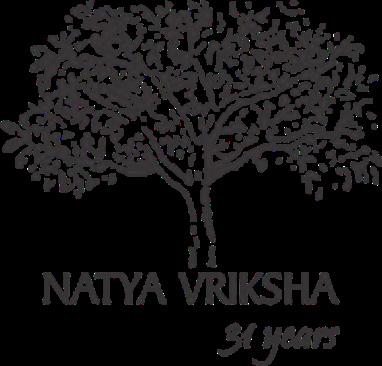
The Department of Art, Media, and Performance has entered into a Memorandum of Understanding (MOU) with Natya Vriksha to explore collaborative opportunities in research, academic programs, courses, and workshops. This partnership aims to leverage both organizations’ expertise and resources, undertaking initiatives focused on social impact, community development, and outreach that contribute to societal betterment.
Founded in 1991 by Padmashri Geeta Chandran, Natya Vriksha is dedicated to promoting Indian art and culture. Over its three-decade journey, it has significantly enhanced Indian classical dance through education, mentorship, and the development of young artists in the arts and culture sectors. Natya Vriksha has been a leader in fostering new conversations around classical dance in India, engaging performing arts enthusiasts, youth, and the broader community through various outreach activities. Its socio-cultural impact is evident through its three key pillars: the NV Dance Academy, the Natya Vriksha Dance Collective, and the annual World Dance Day Festival.
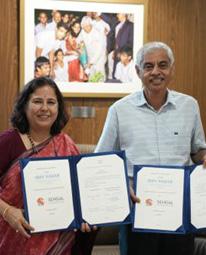
Shiv Nadar University and the S M Sehgal Foundation signed a Memorandum of Understanding (MOU) on July 3, 2025. This partnership represents a significant milestone in expanding our network of domestic collaborations and reinforces our commitment to impactful education and research. Through this MOU, we will facilitate student and faculty exchanges and engage in joint research projects, fostering meaningful interactions across the School of Humanities and Social Sciences, the School of Natural Sciences, and the School of Engineering.
The SM Sehgal Foundation is dedicated to sustainable development and community empowerment at the grassroots level, making them an ideal partner for us. Together, we will explore innovative solutions that address pressing societal challenges, enriching the academic experience for our students and faculty alike.
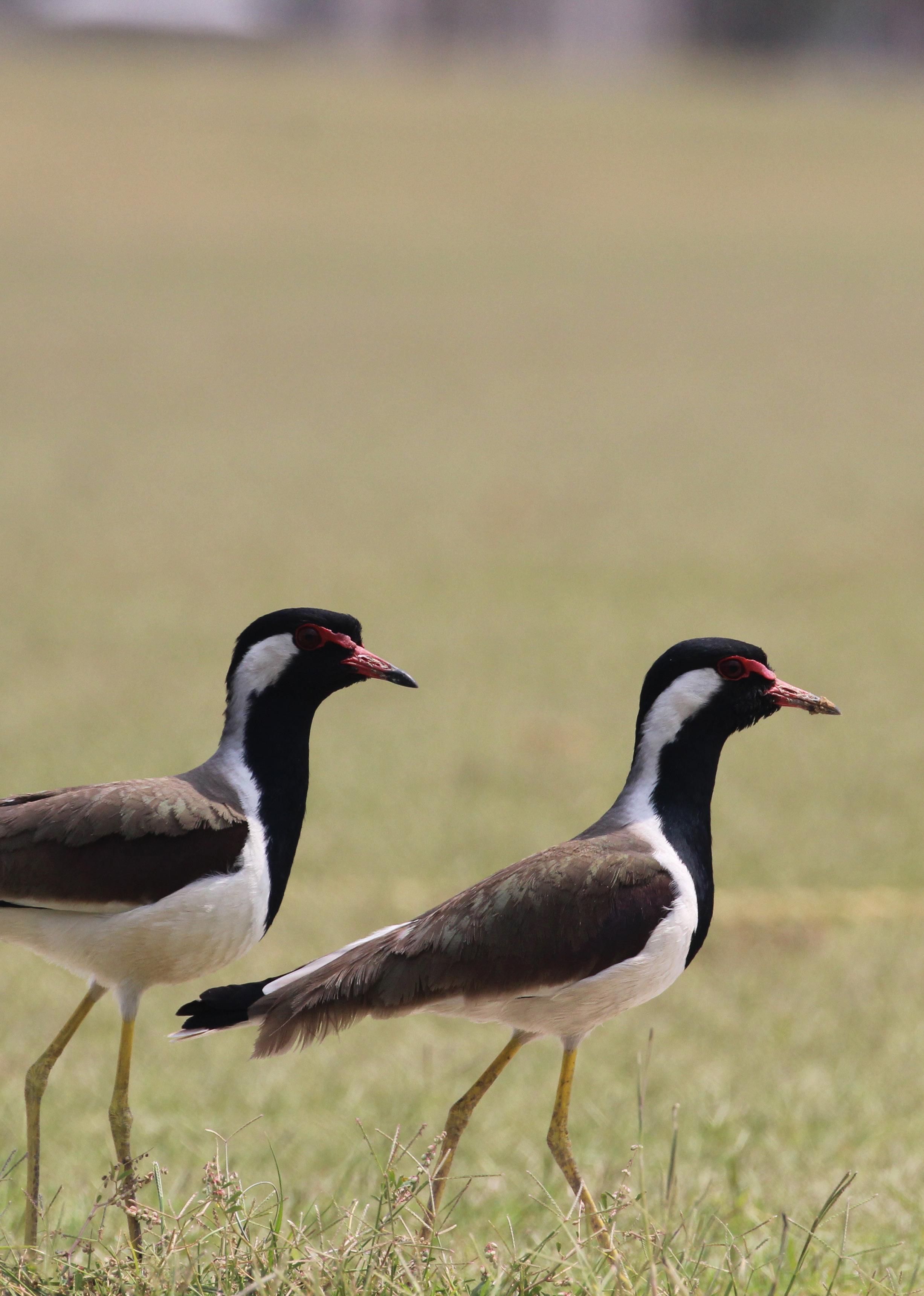
IN THE NEWS
DEPARTMENT OF HISTORY AND ARCHAEOLOGY
MASKI ARCHAEOLOGICAL RESEARCH PROJECT: Summer Internship, June-July 2025
The Maski Archaeological Research Project (MARP) has been working at the site of Maski, Raichur District, Karnataka for the last 15 years. The project is being directed by Dr. Hemanth Kadambi from the Department of History and Archaeology and co-directed by Dr. Andrew M. Bauer from the Department of Anthropology at Stanford University, USA and Dr. Peter, G. Johansen from the Department of Anthropology, McGill University, Canada. This summer MARP undertook fresh excavations, to understand the lifeways of people from the Neolithic to the Medieval periods (approximately 4000 years). Shiv Nadar IoE undergraduates and doctoral scholars participated in these excavations between June 1 and July 15.
Undergraduates:
Shashank S (2nd year), Archita Raghu (2nd year), Purnamrita Jamwal (2nd year), Vikhyath Ramakrishna (2nd year), Vijeetraj (2nd year), Archita Dixit (3rd year), Nandini Menon (3rd year), Saumya Rathore (4th year)
Doctoral scholars
Sampurna Bordoloi, Shamili J
Shiv Nadar IoE’s students were instrumental in documenting our excavations and contributing our latest understanding regarding life in the past in Maski, a prominent prehistoric and historic settlement in Deccan and Southern India.
MARP thanks Archaeological Survey of India, Delhi, Karnataka Department of Archaeology, Museums and Heritage, Mysore, the Karnataka Government and the people of Maski for supporting this field research. Also thanks to the Department of History and Archaeology, and SNIoE.
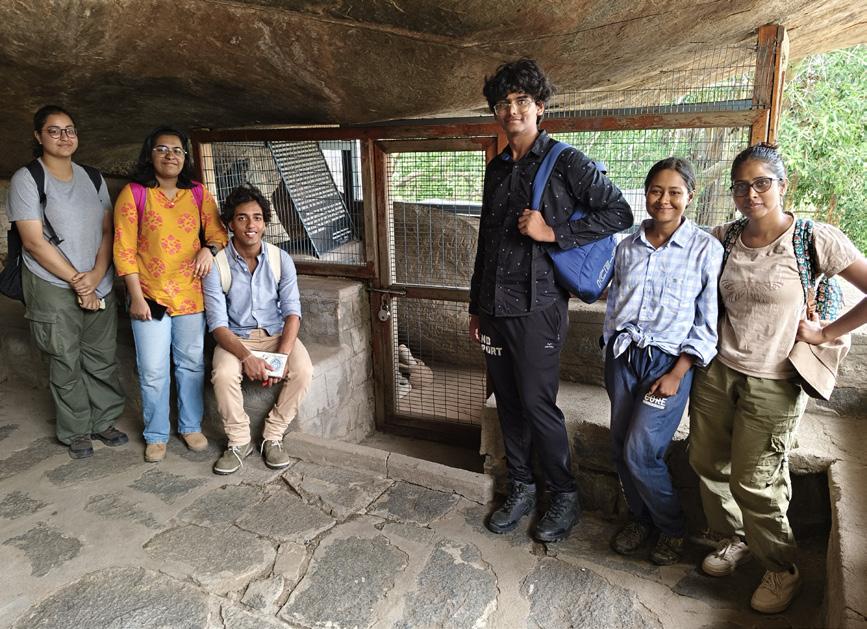
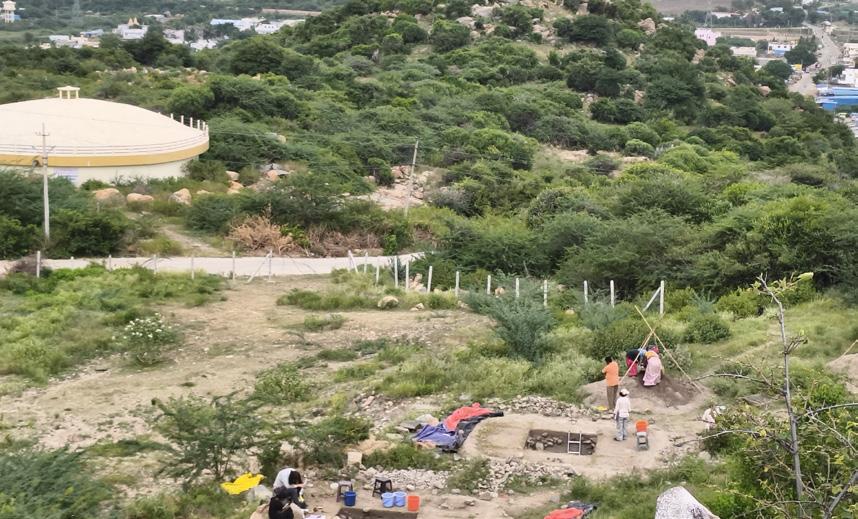
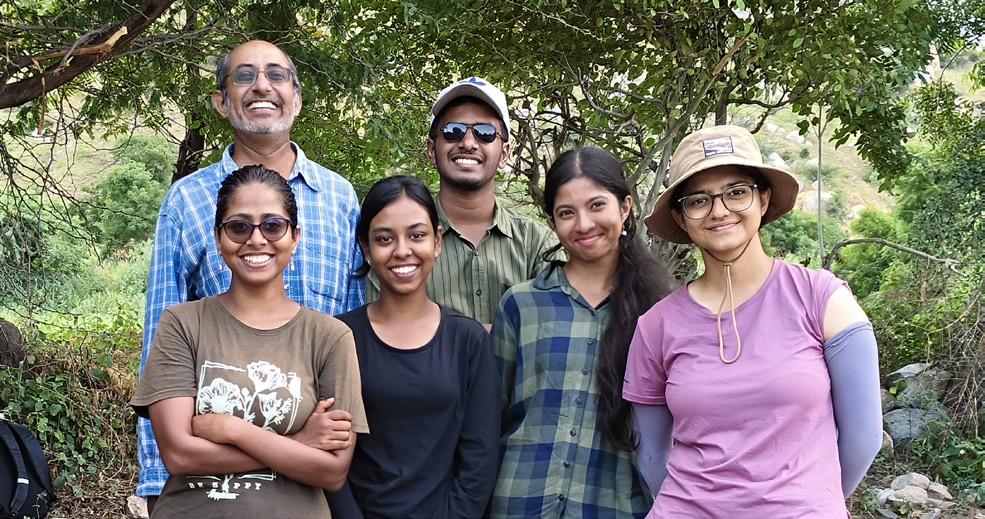
ACCOLADES GALORE
DR. AAKRITI MANDHWANI
ASSOCIATE PROFESSOR, DEPARTMENT OF ENGLISH
Every year, the Society for the History of Authorship, Reading and Publishing (SHARP) recognizes the best book published on any aspect of the creation, dissemination, or uses of script or print. The prize jurors have selected Aakriti Mandhwani’s Everyday Reading: Middlebrow Magazines and Book Publishing in Post-Independence India (University of Massachusetts Press) as a shortlisted finalist title for 2025.
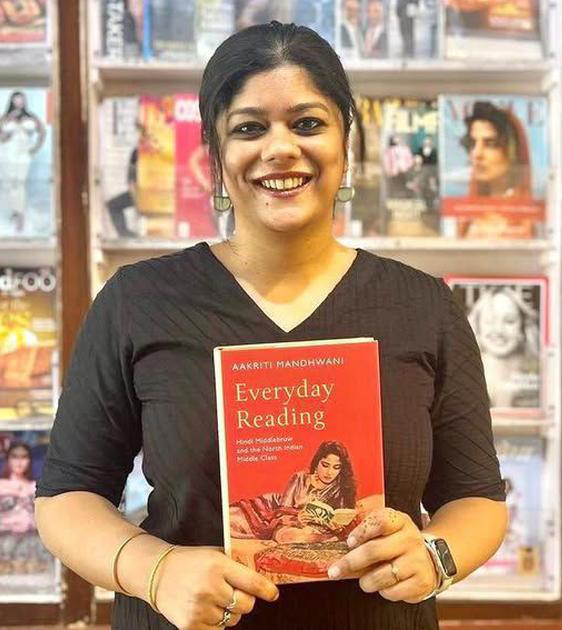
DR. DIVYA KANNAN ASSISTANT PROFESSOR, DEPARTMENT OF HISTORY AND ARCHAEOLOGY
Dr. Divya Kannan’s book Contested Childhoods (Cambridge University Press) has won the Grace Abbott Book Prize for 2025, awarded by the Society for the History of Children and Youth. The book explores the interconnected histories of education, caste, and childhood during the 19th and early 20th centuries in Kerala. It draws on the vast archives of European Protestant missionaries, among other records.
This book initially began as a doctoral dissertation at the Centre for Historical Studies, Jawaharlal Nehru University (JNU) and was supported by the Transregional Research Group doctoral fellowship, a collaboration between JNU, King’s College London, and the Centre of Modern Indian Studies at The University of Göttingen, Germany. More about the book here: https://lnkd.in/epfu5-GJ
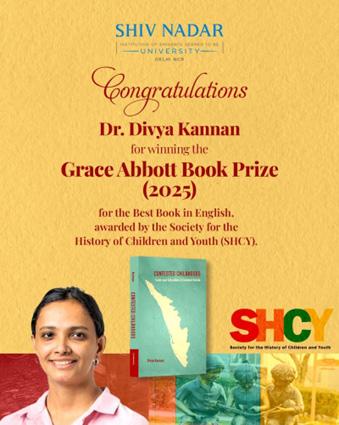
She also presented her paper, ‘Paper Missions: Print Culture, Childhood, and Knowledge Production in Colonial India’ at the Conference on Missionary Sources: The Making, Movement, and Materiality of Knowledge, at Clare College, University of Cambridge, 7-9 July 2025.
Presented her paper, “Women, Cycling and Mobility in India” at the International Workshop: Two Wheels, One World: Global Perspectives on the History of the Bicycle and of Cycling, ETH Zürich, 21-22 August 2025
DR. TEJA VARMA PUSAPATI
ASSOCIATE PROFESSOR, DEPARTMENT OF ENGLISH,
Dr. Teja Varma Pusapati’s monograph Model Women of the Press: Gender, Politics and Women’s Professional Journalism, 1850–1880 is one of the two books to be awarded the 2025 Robert and Vineta Colby Book Prize by the Research Society for Victorian Periodicals (RSVP)!
Dr. Pusapati teaches in the Department of English and her book offers the first extensive account of the rise of the Victorian female journalist as a serious social and political commentator and professional author. Andrew Lewis’ British West Indian Newspapers and the Abolition of Slavery is the co-winner of this year’s prize.
For more information about the prize and past winners, please visit the Colby Prize page. This prestigious award recognizes Dr. Pusapati’s outstanding scholarship in Victorian literary culture, print media, and women’s writing. She is the first recipient from India and we hope this achievement inspires young scholars to explore this vibrant field of research.
DR. TUHINA GANGULY
ASSISTANT PROFESSOR, DEPARTMENT OF SOCIOLOGY
Dr. Tuhina Ganguly, Assistant Professor (Sociology) at Shiv Nadar University, Delhi-NCR, received the Helen Crovetto Award from Nova Religio in November 2024 for scholarship on new religious movements with ties to South Asia.
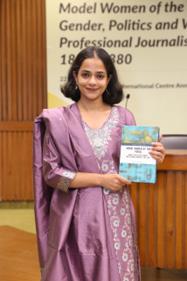
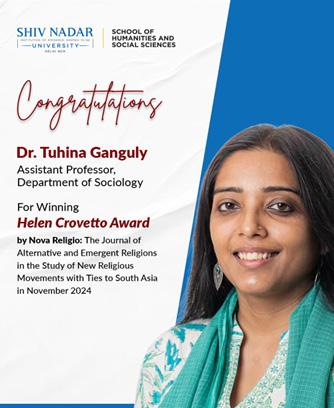
From the Print Media
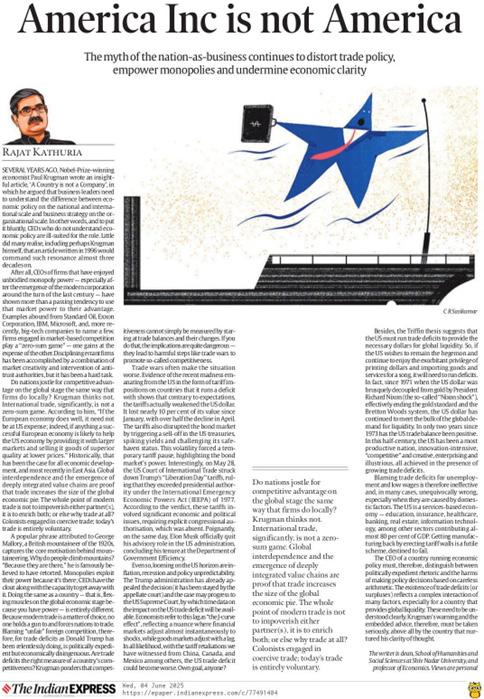
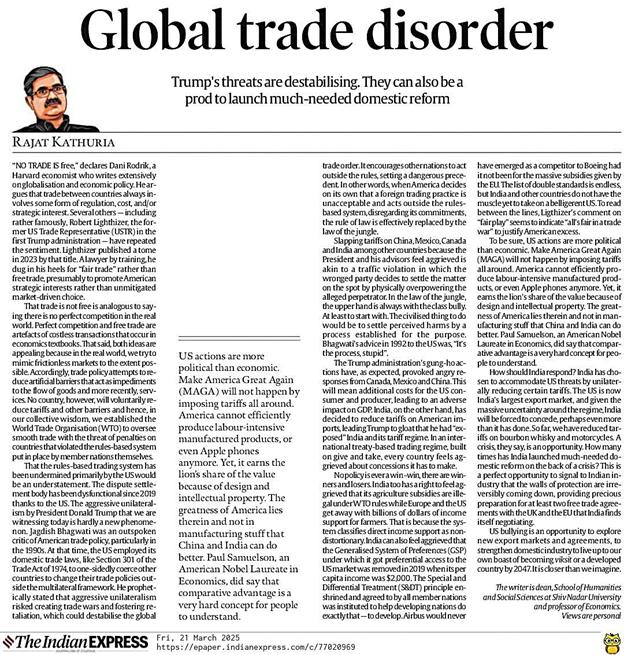
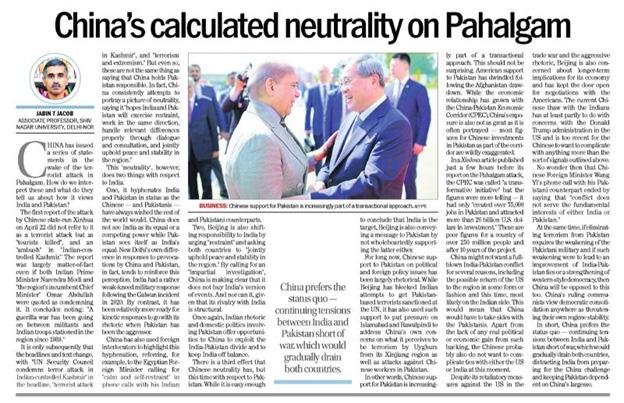
PUBLICATIONS FROM THE CENTRE FOR HIMALAYAN STUDIES
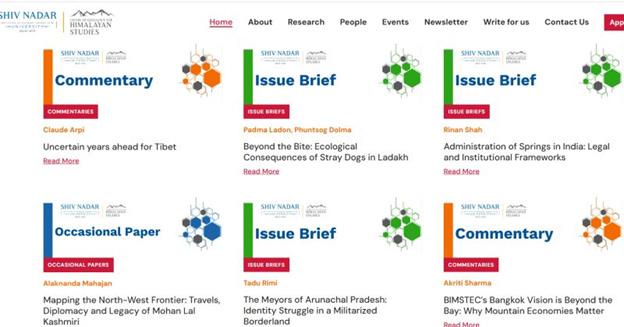
UNCERTAIN YEARS AHEAD FOR TIBET
Claude Arpi
As the Dalai Lama reaffirms the continuity of his institution, a prolonged geopolitical contest over his succession unfolds — with implications for both India-China relations and Tibet’s future.
https://lnkd.in/g2p_EZUc
ADMINISTRATION OF SPRINGS IN INDIA: LEGAL AND INSTITUTIONAL FRAMEWORKS
Rinan Shah
This Issue Brief maps how springs feature in India’s legal and water governance structures, calling for their explicit recognition in planning and policy frameworks.
https://lnkd.in/g5WH9592
THE MEYORS OF ARUNACHAL PRADESH: IDENTITY STRUGGLE IN A MILITARIZED BORDERLAND
Tadu Rimi
Through oral history, this paper explores the lived experiences of the Meyor community, whose homeland is shaped by militarization and historical erasure.
https://lnkd.in/gFwCB6Tb
BEYOND THE BITE: ECOLOGICAL CONSEQUENCES OF STRAY DOGS IN LADAKH
PADMA LADON & Phuntsog Dolma
An examination of the ecological and public health challenges posed by growing stray dog populations in Ladakh, and the need for integrated, community-led solutions.
https://lnkd.in/g4sjjrhw
MAPPING THE NORTHWEST FRONTIER: TRAVELS, DIPLOMACY AND LEGACY OF MOHAN LAL KASHMIRI
Alaknanda Mahajan
A historical account of Mohan Lal Kashmiri’s role in the Great Game, offering a rare Indian perspective within colonial-era narratives of exploration and diplomacy.
https://lnkd.in/gA5kiNAp
BIMSTEC’S BANGKOK VISION IS BEYOND THE BAY: WHY MOUNTAIN ECONOMIES MATTER
Akriti Sharma
Advocating for the inclusion of Himalayan mountain economies within BIMSTEC’s regional cooperation frameworks.
https://lnkd.in/gxquNXky
ACADEMIC EXCELLENCE
OJASW TIWARI
Our UG student from the Department of International Relations and Governance Studies, Ojasw Tiwari (Batch 2023-2027) was a speaker at the third India-ASEAN Youth Conference organised by THE GEOSTRATA in collaboration with Foreign Policy Talks, as part of the Indian delegation. The conference, with the theme ‘From Look East to Act East – Navigating India-ASEAN Partnership in a Multilateral Era’, featured keynote speeches from senior ASEAN and Indo-ASEAN Business Chamber officials. Delegates from both regions discussed shifting power dynamics in the Indo-Pacific, U.S. and China’s regional roles, and the future of maritime and trade cooperation.
Ojasw shared his insights on how India, ASEAN, and China can balance strategic autonomy with collaborative growth, through cultural linkages, digital innovation, and economic pragmatism, to shape a resilient, multipolar Indo-Pacific.
RISHABH KACHROO
Rishabh Kachroo, published a paper on hunger-free world demands a post-growth rewiring of the global agrifood system. The paper uses Critical IR theory to reveal the structural mechanisms through which growth-hegemonic theorisation of agriculture sustains hunger. Alternative forms of structural power in decentralised agroecological systems reflect post-growth principles which are counter-hegemonic voices ensuring socially-just agrifood systems.
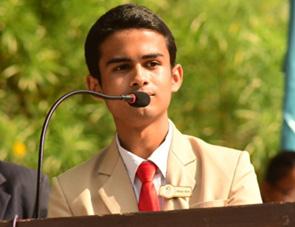
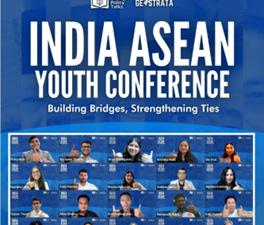
Articles by Rishabh Kachroo
Article “Vaccinated But Unconvinced: How the Government, Science and People Are Locked in a Cycle of Distrust”, The Wire (June 25 2025)
Article “What does the Indian Constitution truly ask of its citizens when it speaks of scientific temper?”, The Leaflet (July 1 2025)

KARTHIK PAYYALIL
Karthik Payyalil has been awarded the prestigious Charles Wallace India Trust (CWIT) Research Grant for 2025–26, sponsored by the British Council. His research title is, “From A Trans-Imperial Forced Labour Regime to the International Labour Organization: A Genealogy of Native Labour Code, 1842– 1930” — exploring the evolution of labour governance across empires. This CWIT grant provides access to key UK-based archives and primary sources, enabling both scholars to uncover critical, often overlooked documentation.
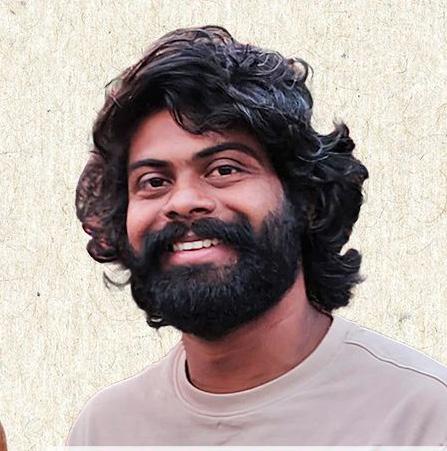
TEJASVI SAXENA
Tejasvi Saxena has been awarded the prestigious Charles Wallace India Trust (CWIT) Research Grant for 2025–26, sponsored by the British Council. His research title is “Tracing the gendered nature of India’s Diplomatic Historiography and the contribution of Indian Women Delegates/leaders in shaping India’s internationalist presence (1920–1970)” — uncovering the role of women in India’s foreign policy history. The CWIT grant provides access to key UK-based archives and primary sources, enabling both scholars to uncover critical, often overlooked documentation
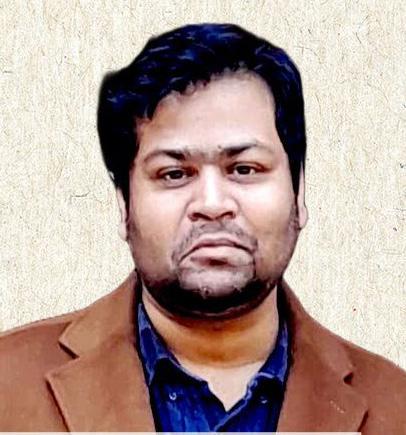
Participation on two panels, British International Studies Association, Belfast, UK (June 1820 2025)
Article “Engendering Indian Foreign Policy Analysis: AIWC, Women Delegates and Diplomatic Praxis”, Studies in Indian Politics. Co-authored with Dr. Sruthi Muraleedharan (June 2025)
Ph.D. GUIDE
DR.
SRUTHI MURALEEDHARAN ASSISTANT PROFESSOR,
DEPARTMENT OF INTERNATIONAL RELATIONS AND GOVERNANCE STUDIES
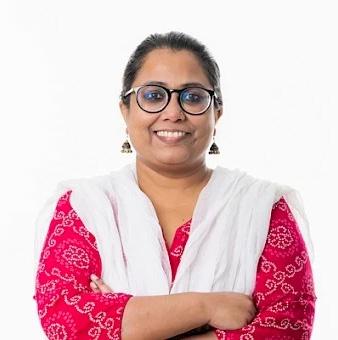
NAMITA SHARMA
Namita Sharma has been awarded the prestigious Institute of Chinese StudiesHarvard Yenching Institute (ICS-HYI) Multi-year Doctoral Fellowship. This is one of the most esteemed scholarships for the study of China in India. As part of this fellowship, Namita will spend two years in China — one year for intensive Mandarin language training and another year conducting research at an HYI partner university. Following this, she will spend the third year at the Harvard-Yenching Institute, based at Harvard University in the United States, before returning to India to complete her doctoral degree.
SUBHASH BHAMBHU
Subhash Bhambhu has been selected for the Meera Sinha Bhattacharjea Award by ICS, New Delhi, for his presentation in the 17th All India conference on China Studies held at Mahe, Manipal.
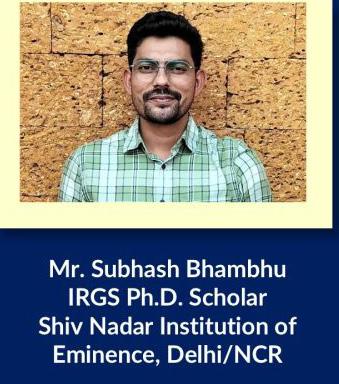
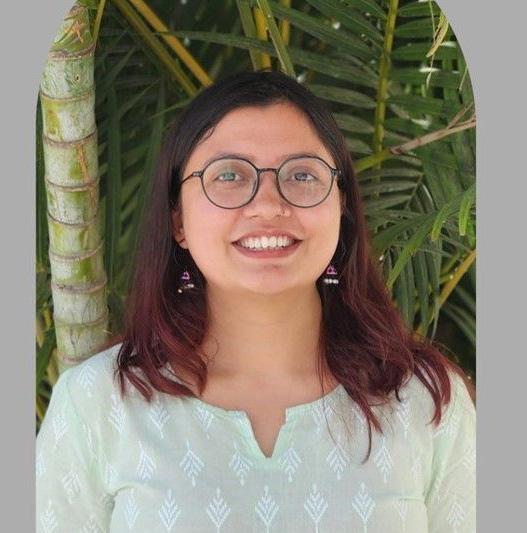
SWARATI SABHAPANDIT
Swarati Sabhapandit was awarded her doctorate from SNIoE in the 11th Convocation (May 24 2025). She was the first PhD conferred by IRGS.
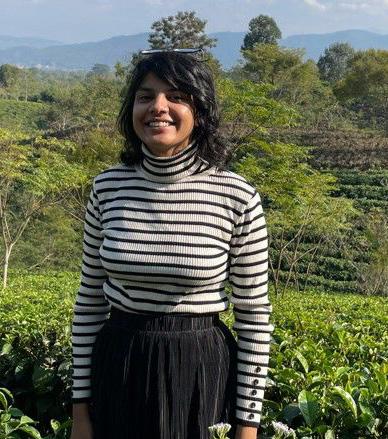
BILAL AHMAD TANTRAY
Article “Stirrings of Hope? Notes from Colombo and Jaffna”, India Forum (June 23 2025) Fradreck Jockonia Mujuru
Article “Mine Warfare and the Second Chimurenga in Zimbabwe”, Small Arms
Journal
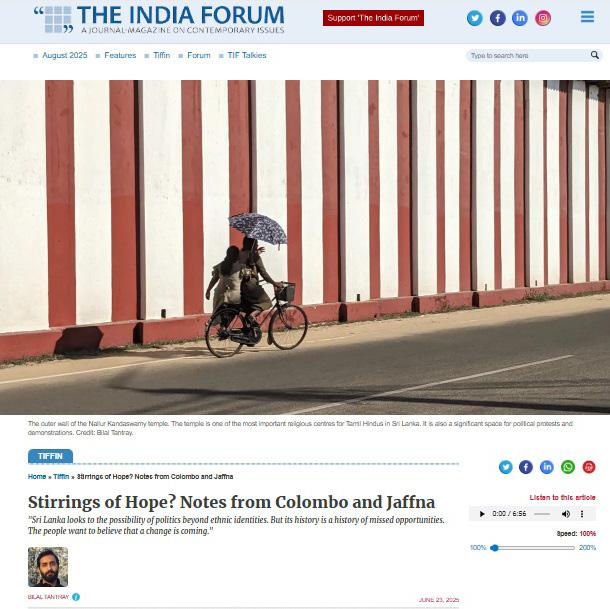
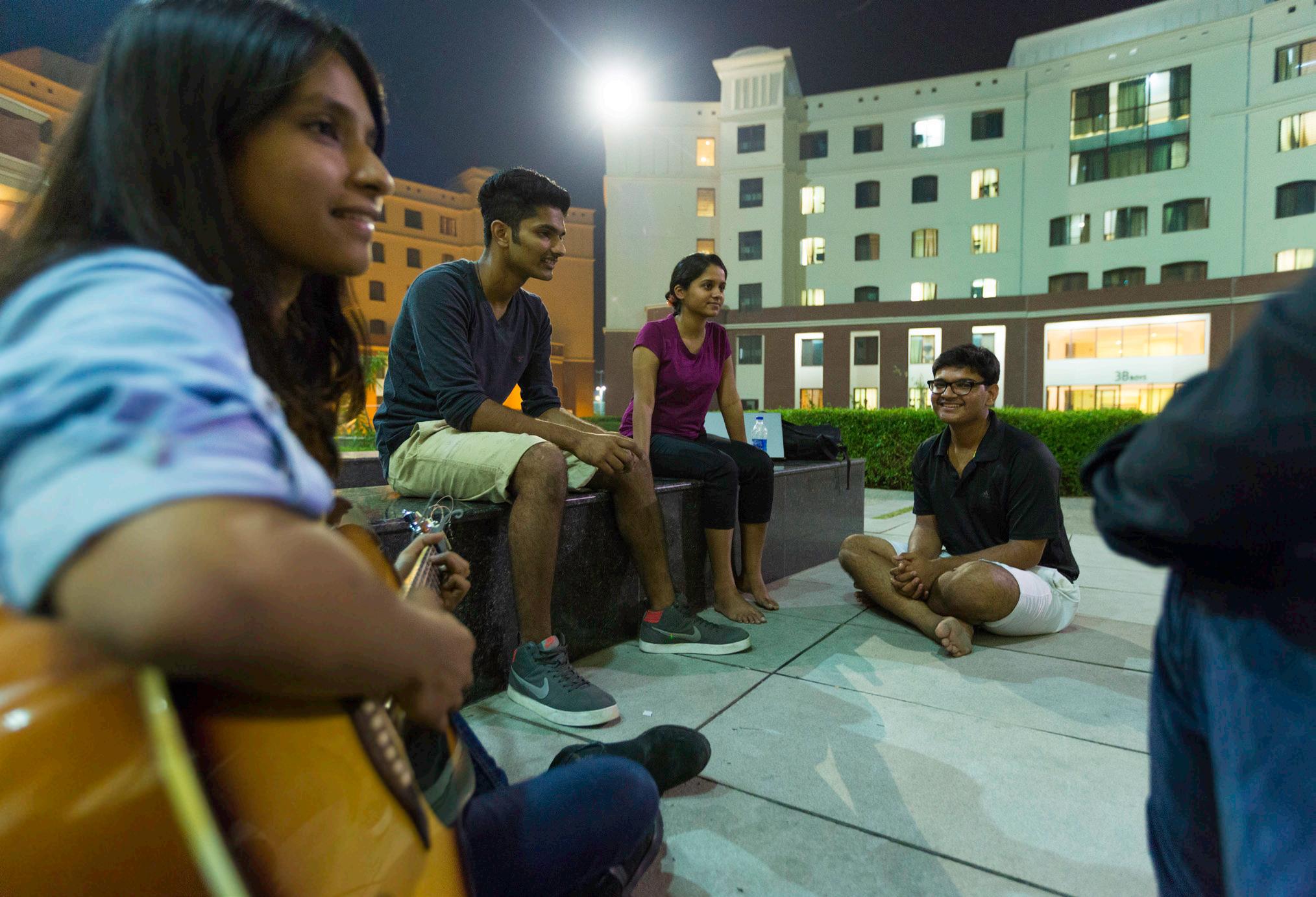
ANSHIKA MATHUR
Anshika Mathur, a PhD student from the Department of Economics presented her paper at the Society for the Study of Economic Inequality (ECINEQ) Conference at The World Bank in Washington, DC, from July 9–11, 2025!
“I presented my paper titled “From Workforce to Grandparenting: Navigating the Challenges of Informal Childcare” at the Eleventh ECINEQ Conference, organized by the Society for the Study of Economic Inequality and hosted at the World Bank, Washington, DC. I am grateful to have received full sponsorship for my participation from the World Bank and George Washington University. The conference provided a valuable platform to engage with researchers, and I received thoughtful feedback and participated in meaningful discussions. It was also encouraging to find that many attendees were already familiar with the Department of Economics and the faculty at Shiv Nadar IoE, which made it easier to initiate conversations and build connections across institutions.” – Anshika Mathur
ABINASH PANDA
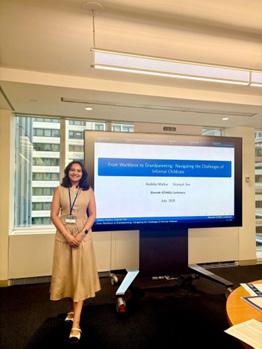
Abinash Panda, a fifth-year Ph.D. student, presented my paper “Pairwise Strategy-Proof Social Choice Functions over Restricted Dichotomous Domains” authored with Anup Pramanik (Shiv Nadar Institution of Eminence) and Yu Zhou (Nagoya University), at the 14th Conference on Economic Design held at the University of Essex. The Society for Economic Design is an international academic organization that brings together researchers working broadly in the area of economic design. The conference featured papers from diverse disciplines, including Economics, Political Science, Computer Science, Operations Research, and related areas.
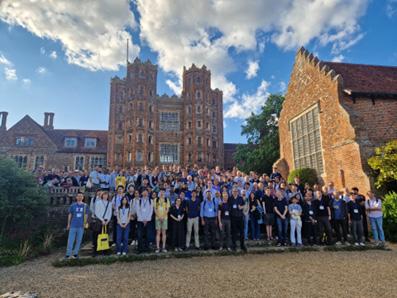
BINAY SHANKAR
Binay Shankar, a third-year Ph.D. scholar, was selected for the Visiting Scholars Programme 2025 at the Indira Gandhi Institute of Development Research (IGIDR) in Mumbai. From May 15 to August 14, 2025, he worked under Dr. Bharti Nandwani, drafting the second chapter of his dissertation titled “Rural Roads and Firm Outcomes in India.” This research examines the impact of the Pradhan Mantri Gram Sadak Yojana (PMGSY) on firm dynamics in rural areas, finding that improved connectivity significantly boosts turnover, sales, profits, and employment, especially in the informal non-farm sector.
In addition to his dissertation, Binay is developing a 100-year database on weather changes in India, using Python and QGIS for spatial data extraction. This project highlights his expertise in climate data, geospatial analysis, and development economics.
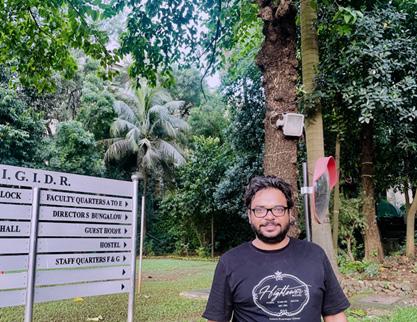
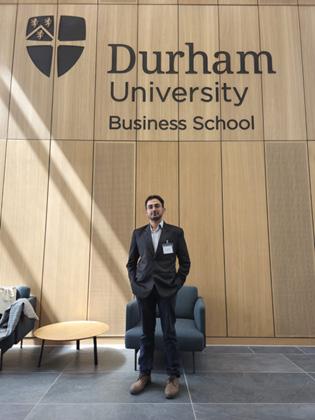
SOURISH MUSTAFI
This summer, Sourish presented his paper titled “Guns and Gains: Effects of Exposure to Counterinsurgency Operations During School-Age Years,” co-authored with Bharti Nandwani (IGIDR) and Punarjit Roychowdhury (Shiv Nadar Institution of Eminence), at the 2nd Development Economics Workshop at Durham University, UK. The workshop gathered doctoral students and faculty worldwide to discuss cutting-edge research in development economics, focusing on conflict, education, health, and empirical methods. Sourish’s paper examines the impact of exposure to counterinsurgency operations on human capital and labor market outcomes in India, providing valuable feedback from leading scholars.
Additionally, he contributed an op-ed to The Telegraph (June 2025) titled “When AI is Anglophone,” discussing how AI may deepen inequality by marginalizing non-Englishspeaking users and advocating for greater linguistic inclusivity in digital ecosystems. These experiences have been intellectually enriching and professionally rewarding for him.
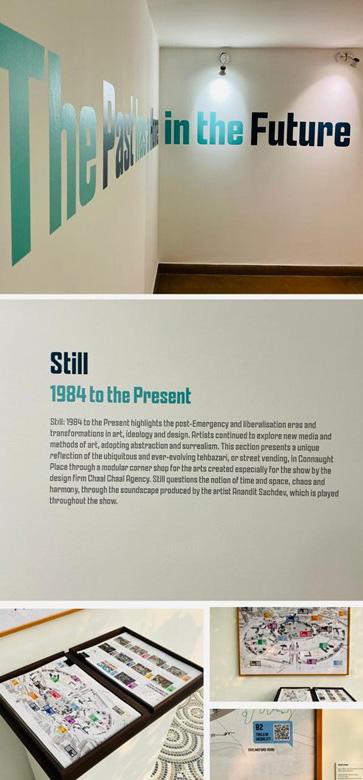
SONIC ARCHAEOLOGY OF CONNAUGHT PLACE
Anandit Sachdev, 2024
Sound is a simultaneous question of time and space. Background chatter in a cafe, distant noise of construction, automobile vibrations and horns, and different birds and beings which inhabit our environments – all create a simultaneity of ambient noise and soundscapes. Each reveals themselves through sound. The sound of a typewriter’s clicking evokes its own time and space –revealing the context of its existence and technological development. Similarly, the sound of the Paytm soundbox not only announces the receipt of funds to a vendor but also amplifies the existence of digital economy so desirable to a developing nation pressing forward into its own futurity. In numerous ways, sound contains and reveals stories of places, people, societies, cultures and of their nebulous existence across different times. In doing so, sound as an entity can reveal simultaneously the past and the present of a place.
I was approached by Dr. Annapurna in 2022 to interject at the level of sound in Connaught Place for a sound art project. I knew that my artwork needed to play at these previously mentioned thresholds of corporeality, selfhood, temporality and spatiality. While my artwork titled “Sonic Archaeology of Connaught Place” is an exploration of these nebulous attributes of sound, I was simultaneously trying to understand what it means to interact with a piece of sound art within the spatial boundaries of a given gallery space. How could my artwork not interact with the material and social context of its reproduction? Eventually I started asking myself – how can I loop sound to fracture or reinforce the conception of time? How can I expand or contract sound to alter the spatial perception of the gallery
space? How can I use the absence of sound as part of my soundtracks to reveal a presence of a soundscape inherent to the gallery itself? I wanted to know how I can engage with and bend the boundaries of my artwork and the art gallery, and how a visitor will eventually engage with it.
Noise in Connaught Place permeates every nook and corner giving it a sonic texture – a texture of heterogenous sounds. Once we capture/ record a small section/ segment of noise, it not only reveals the content but also the context and conditions of its capture. Like an archaeological object sheds light on the past, field recordings can help us capture and contain a contextual knowledge of sound. The field recordings and sonic information gathered between October 2023 to January 2024 in various locations across Connaught Place for this project became sonic artefacts capturing urban memory and contexts in the present. As one starts listening to these field recordings, the act of listening itself helps frame meaning of these sonic artefacts. One starts to listen for and identify cultural markers through sound – languages, speech, the sounds of religiosity, sounds of technology, etc. I reframed and categorized these field recordings based on their content and characteristics of sound embedded within them. Based on these categories, I created 10 tracks – each evoking the cultural context, meaning and textures of sound encountered in Connaught Place.
My artwork offers less of a focus on sounds found in Connaught Place – for these can be listened to with enough intent and attention by themselves – but more of a meditation on what it means to create a piece of sound art in a context so richly informed by the daily negotiations of its denizens. It is my hope that I achieved a fraction of what I set out to achieve, and my belief that I could convey the same to you.
SUMMER INTERNSHIPS
INTACH, KNMA, HCL Foundation, Xpertiz, NABARD, Fidelity, CAFRAL, RBI, BITS Pilani Goa, IIM Bangalore, ISB, SEWA, SARAI, Teach for India Campus Ambassador, Eklavya Foundation, PARI, Navsahyog Foundation, Centre for Social and Economic Progress, Centre for Civil Society, CLAWS, IRADe, DE Shaw, Goldman Sachs, Uttarakhand Seva Nidhi (USNPSS), NITI Aayog, SM Sehgal Foundation
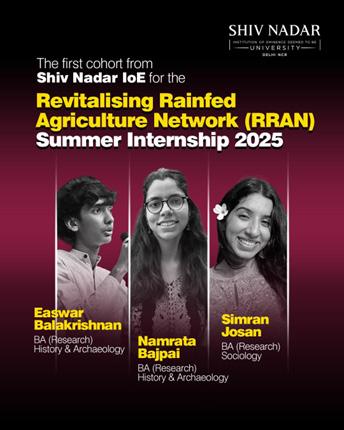
Three undergraduate students from the School of Humanities and Social Sciences have been selected for a 2-month internship with the Revitalizing Rainfed Agriculture Network (RRAN). The interns will collaborate with RRAN partners on two key themes aimed at enhancing climate resilience in India’s rainfed agriculture:
1. Farmer Innovation: Strengthening Scale and Scope (nationwide)
2. Documenting and Mapping Public Investment Opportunities in rainfed agriculture (Maharashtra, Himachal Pradesh, Bundelkhand)
Their outputs may include written reports, datasets, social-ecological system mappings, communication materials, or policy briefs, as mutually agreed upon with the partner organization. RRAN is a collaborative network of over 900 researchers and practitioners dedicated to developing productive and resilient rainfed agriculture systems.
ZAFAR HABIB & SHIVANSHI
Zafar Habib, an undergraduate studying History & Archaeology, and Shivanshi, an undergraduate in International Relations & Governance Studies, will intern this summer with Collective News Room, the exclusive content provider for BBC News in India.
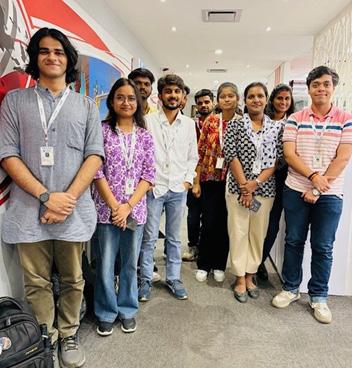
A. Niveditha and Sudhanva Kankanwadi, currently in their third year spent a month pursuing the Deccan Studies Program, organised by the Deccan Heritage Foundation. This summer school consists of a month-long journey through the medieval historical sites of Deccan, complemented by lectures by historians and scholars. The program also provides exposure to restoration and conservation of heritage monuments and sites.
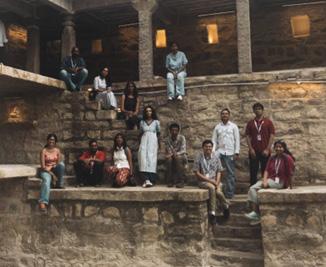
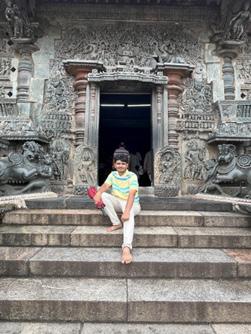
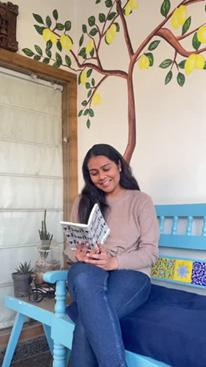
Khushi Mohunta, of the MA English batch 2024-2026, secured an internship at Harper Collins. She joined the leading publisher’s trade editorial department in May 2025.
Akash Tripathi (class of 2026) was a Research Intern at Indian Council of World Affairs (June 2025)
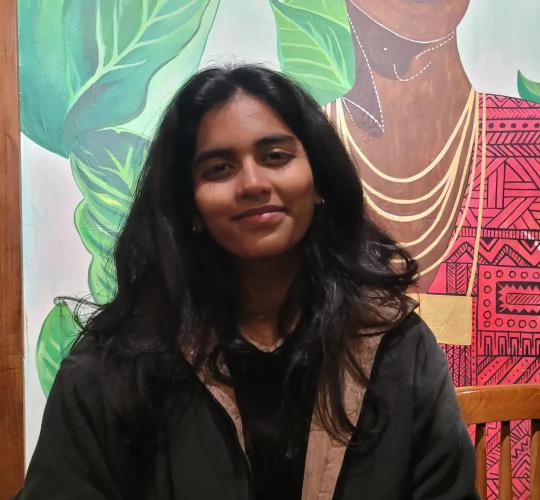
Pavithra Sr. (Class of 2026) was the recipient of the Abhijit Sen Rural internship with the National Foundation for India (NFI).
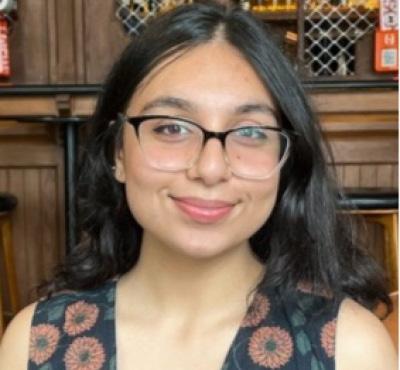
Shirin Bhatnagar (class of 2028) has secured an internship opportunity at The Indian Express (July 2025)
Nahla Mohammed K.T, PhD scholar, Department of History and Archaeology, presented a paper at the International Critical Muslim Studies Conference on Reorienting Resistance, Istanbul, 30 May- 1 June 2025.
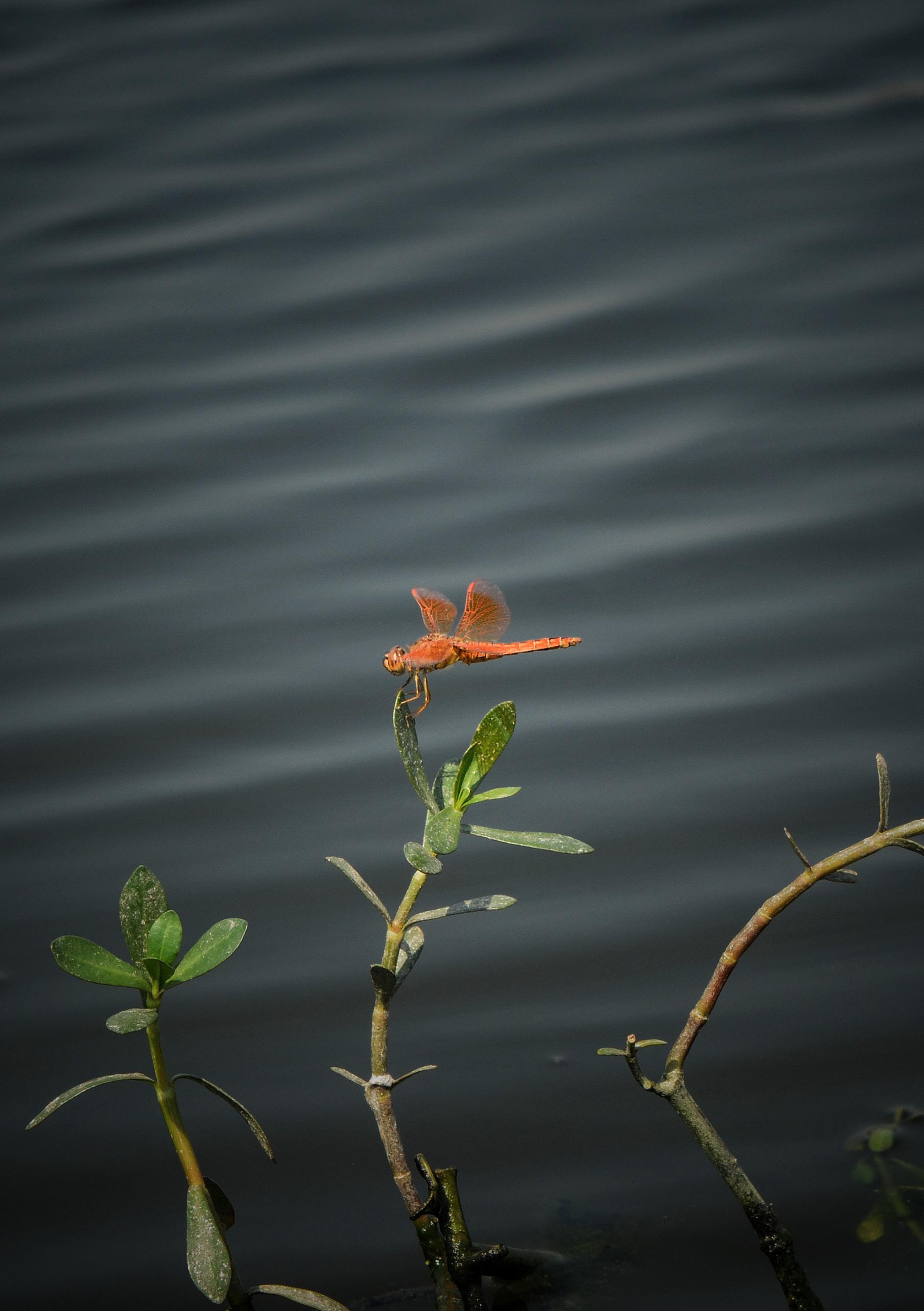
NCERT Internship | Department of Design
Six of our B.Des students were selected for a 8 week internship at the Department of Educational Kits, NCERT, New Delhi.
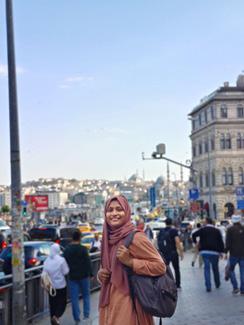
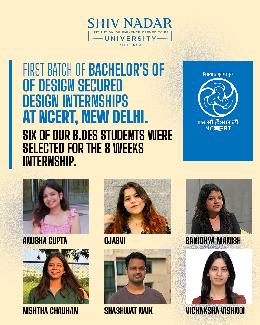
ALUMNI
SONI YADAV BA(RESEARCH) SOCIOLOGY
Selected for the Young India Fellowship, 2025 | Ashoka University
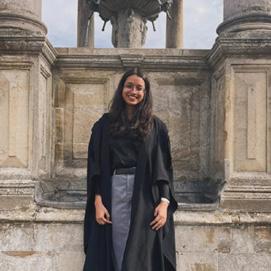
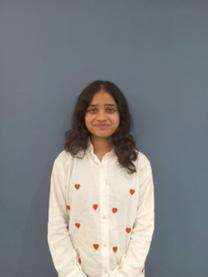
SAUMYA SAINI
Saumya Saini ( Class of 2024, Department of History and Archaeology) has been awarded a Distinction for her MPhil in World History, University of Cambridge for her dissertation titled “Partition Memories and Public Histories in India and Britain, 1947-present”.
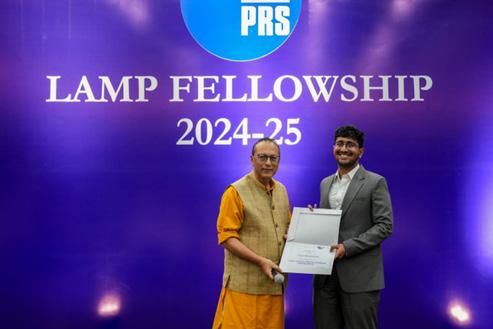
ADITYA RAMAKRISHNAN
Aditya Ramakrishnan, an alumni of the Department of International Relations and Governance Studies graduated from the LAMP fellowship this year. Aditya graduated from the university last year and was awarded the silver medal.
ANANYA CHAURASIA
Ananya Chaurasia (class of 2025) received a full scholarship for IR – MSc Asian Studies at Rajaratnam School of International Studies, Nanyang Technological University, Singapore (August 2025 onwards)
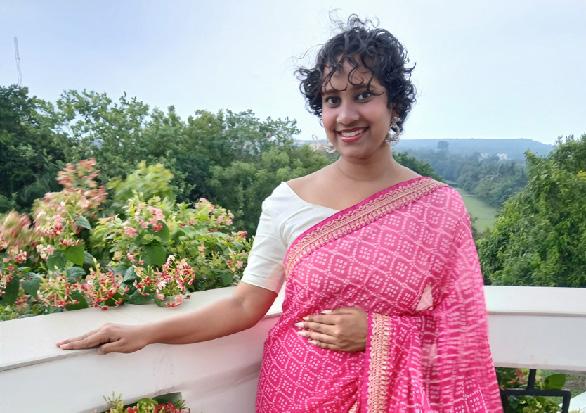
NAISHA KHAN
Naisha Khan (class of 2025) received a full scholarship for IR – MSc International Relations at Rajaratnam School of International Studies, Nanyang Technological University, Singapore (August 2025 onwards). She has been awarded the Student Research Assistant Study Award at RSIS, which fully covers tuition fees and includes a monthly stipend of 1000 SGD.
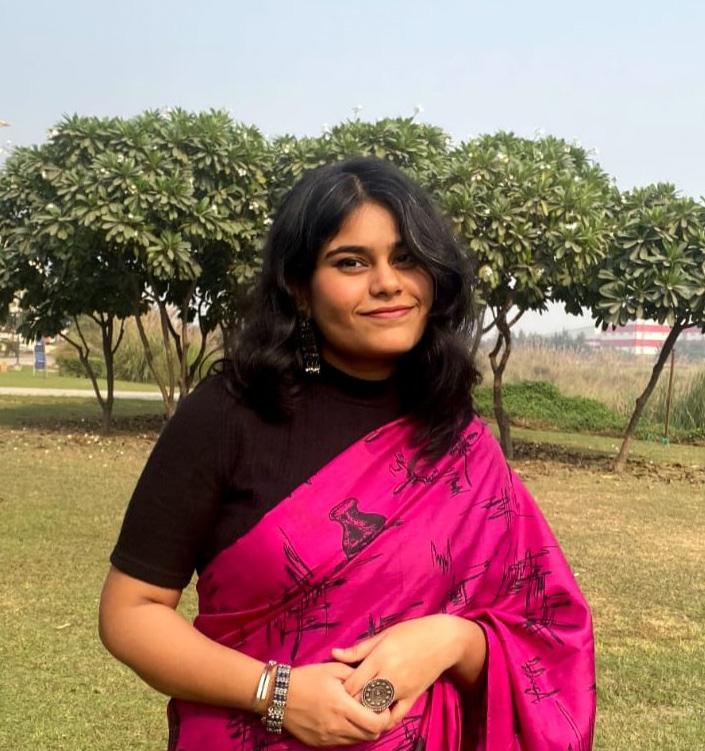
APURVA JHA
Apurva Jha (class of 2025), graduated with the highest distinction, got placed as Junior Tactical Analyst at Max Security Intelligence. She also got accepted to the Hertie’s School for Master of Public Policy program.
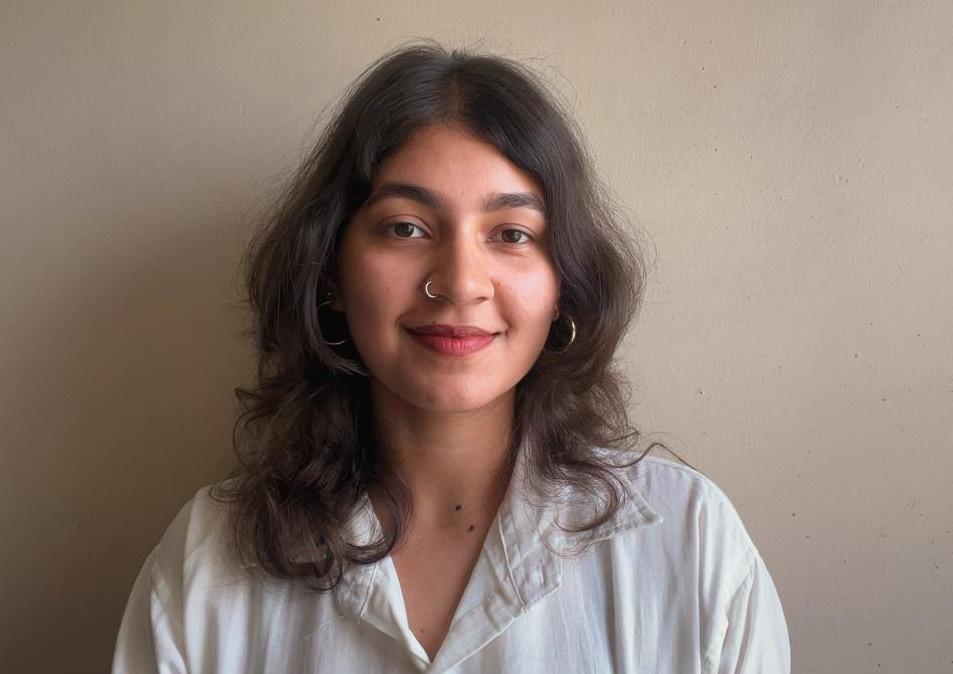
ANANYA JUNEJA
The publication of Ananya’s first academic work, a coauthored chapter with Vinayak Das Gupta , is now part of Bloomsbury’s anthology titled “Cinema and the Indian National Emergency.”- https://lnkd.in/gb8WfGuV
This article is a culmination of the research and writing she conducted as Dr Dasgupta’s Research Assistant during her Master’s at SNU. The article studies the Indian Emergency to argue how official archives fail to capture traumatic historical events, and posits that a comprehensive understanding of such periods requires the integration of diverse “artefacts”- including cinema.
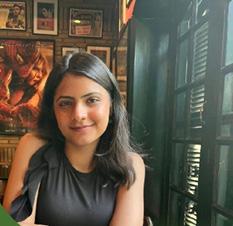
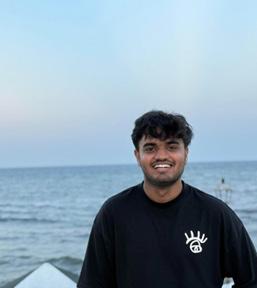
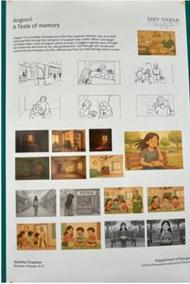
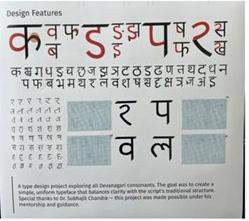
SANTHOS RAM
Santhos Ram M S, a recent graduate from the University, has been accepted into the MS in Integrated Product Design program at KTH Royal Institute of Technology in Sweden. His interest in product design was sparked by a course taught by Dr. Prakash Kumar, which revealed the potential of blending engineering with creativity and user empathy. This pivotal experience inspired him to pursue a Design Minor alongside his core mechanical studies. Santhos earned his B.Tech degree with a major in Mechanical Engineering and a minor in Design.and a minor in Design.
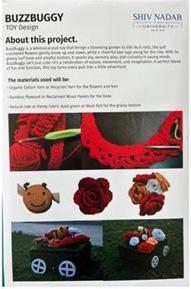
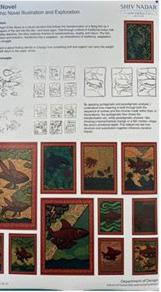
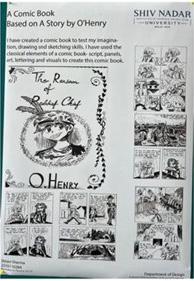
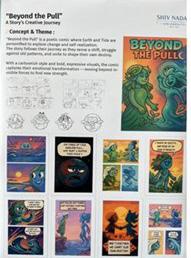
UPCOMING !
180 Degree Consulting chapter at our university!
This initiative presents a unique opportunity for students to engage, learn, and make a difference in our community. We encourage all students to join this exciting journey, collaborate with your peers, and contribute to meaningful projects.
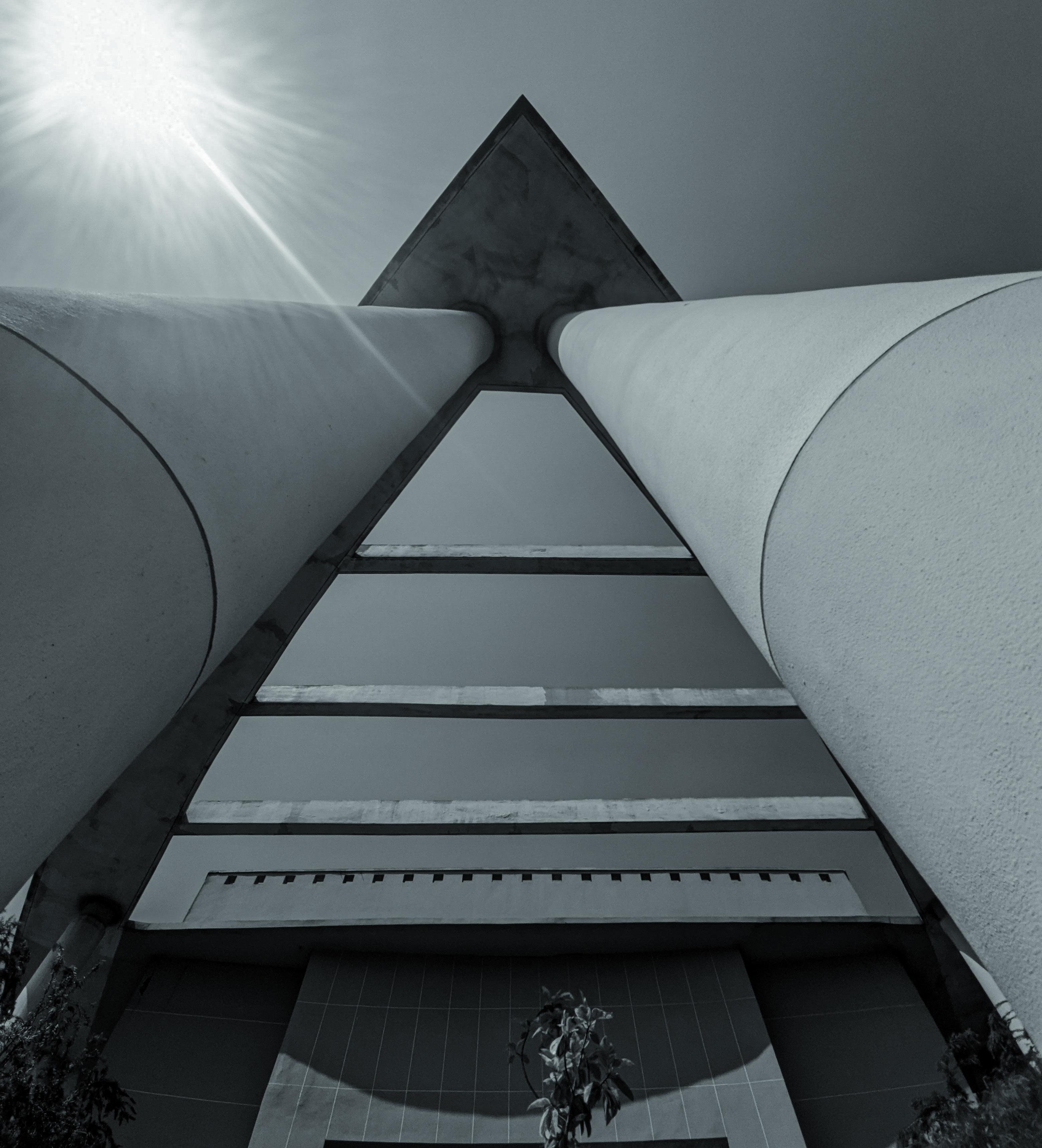
The School of Humanities and Social Sciences
NH 91, Tehsil Dadri, Gautam Buddha Nagar, Uttar Pradesh - 201314, India www.snu.edu.in
Back Cover
Artwork
by: Sayak Mohanta (AMP Class of 2024)
